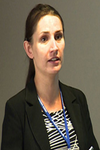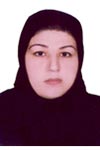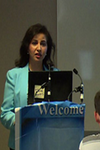Day 2 :
Keynote Forum
Janet Hammond
Roche Pharma Research and Early Development, Switzerland
Keynote: The role of the pharmaceutical industry in responsible antibiotic stewardship
Time : 08:30-08:55

Biography:
Janet Hammond has been head of infectious diseases at Roche Pharma Research and Early Development (Roche pRED) since June 2012. She was previously vice-president, translational medicine in Roche pRED’s former virology research group. Before joining Roche, Janet served as chief medical officer and senior vice-president of global medical affairs at Valeant Pharmaceuticals. Her other industry positions have included: group director, global clinical research, virology and infectious diseases at Bristol-Myers Squibb; and head of clinical drug discovery virology at GlaxoSmithKline. Janet received her MD and PhD degrees from the University of Cape Town, South Africa.
Abstract:
Global public health bodies warn that without urgent, coordinated action the world is heading towards a post-antibiotic era, where previously treatable common infections can once again kill. Antibiotic resistance inevitably develops through continuous bacterial evolution, but excessive inappropriate use of antibiotics accelerates adaptation of infectious organisms to antibacterial medicines. Appropriate antibiotic use accompanied by better testing and diagnostics may ensure treatments are maintained, for longer. This means the urgent need to develop new antibiotics must be accompanied by behavioural changes in how these vital medicines are utilised: A behavioural change in stewardship, for which the pharmaceutical industry can take a leading role. Antibiotic stewardship aims to achieve best clinical outcomes related to antibiotic use while minimizing toxicity and other adverse events: limiting pressure on bacterial populations that drives the emergence of antibacterial-resistant strains. Antibacterial stewardship involves coordinated interventions designed to improve and measure appropriate use of antibiotics by promoting the use of optimal treatment including dosing, duration of therapy and route of administration. The need for coordinated action against multi-drug resistant bacteria has been globally recognized. In May 2014, the Transatlantic Taskforce for Antimicrobial Resistance (TATFAR) recommended incentivizing antibacterial drug development, as is now being done. Governments and regulatory authorities have also created special pathways for new antibiotics given the high, unmet medical need. Pathogen-specific antibiotic development provides the potential to target and tackle specific bacterial infections with the opportunity to combine novel diagnostics that promote personalized healthcare. This innately advocates a more selective and responsible prescribing behavior than with broad-spectrum antibiotics. However broad-spectrum antibiotics are vitally important in treating the majority of bacterial infections in clinical practice and must not be overlooked. Drug development programs have been initiated which look at how novel treatments can restore or potentiate the antibacterial effects of broad-spectrum antibiotics, like beta-lactam antibiotics. The pharmaceutical industry’s role should not be limited to novel drug development: it also has the opportunity to vitally support public and healthcare professionals’ education on the appropriate use of novel treatments. This will contribute to a wider commitment in working with medical societies and institutions in the fight against antibiotic resistance.
Keynote Forum
Stef Stienstra
Dutch Armed Forces/Royal Dutch Navy, Netherlands
Keynote: Novel technologies and innovations for prevention and treatment of “Infectious diseases†including EBOLA
Time : 08:55-09:20

Biography:
Stef Stienstra is a Strategic and creative consultant in biomedical science, with a parallel career as a Commander of the reserve of the Royal Dutch Navy. For the Dutch Armed Forces he has responsibility for the counter measures in CBNRe threats and (medical) consequence management both in a military and a civilian (terrorism) setting. He is strategic functional specialist for “Health & Environment” of the 1-Civil-Military-Interaction Command (1-CMI) of the Dutch Armed Forces and for 2015 also in the NATO Response Force (NRF), which is in 2015 the responsibility of the 1-German-Netherlands-Corps (1-GNC). rnHe was the director of the 2014 World Congress of CBRNe Science & Consequence Management in Tbilisi, Georgia. rnIn his civil career he works internationally as consultant or as scientific supervisory board member for several medical and biotech companies, merely involved in biodefense. He is also visiting professor for Punjab University in Pakistan and Rhein-Waal University in Germany.He has finished his studies in Medicine and in Biochemistry at the University of Groningen in The Netherlands and has extensive practical experience in cell biology, immuno-haematology, biodefense and transfusion medicine. His natural business acumen and negotiation competence helps to initiate new successful businesses, often created out of unexpected combinations of technologies. His good understanding of abstract science combined with excellent skills in the communication of scientific matters to non-specialists, helps him with strategic consulting at top level management.
Abstract:
Introduction: It is impossible to protect whole nations from the effects of bioterrorism by preventive vaccination. There are too many possible agents, the costs would be exorbitantly high, and the health risks associated with complex mass vaccination programs would be unacceptable for the public health authorities. Adequate protection, however, could be provided via a combination of rapid detection and diagnosis with proper treatment for those exposed to biological weapon agents. Preferably this should be done with therapeutics, which would be beneficial in all stages of infection to disease.
Methodology: Immunoglobulins and/or monoclonal antibodies, preferably from human origin, can be used to prevent severe complications by neutralizing or blocking the pathological elements of biological agents and these are the optimal candidates to be deployed in case of biological warfare or a bioterrorist event. Also for natural outbreaks, like the recent and still ongoing Ebola Virus Disease (EVD) outbreak in West Africa, the use of human antibodies against the virus have shown to be effective. These antibodies were givens as immunoglobulin obtained from the plasma from survivors of the EVD or as isolated antibodies from human EBV survivors, which are multiplied in human cell culture processes.
Discussion: As an example of the latter technology recent research in aerosol challenged rabbits has shown that the application of a combination of a human monoclonal antibody against the protective antigen (PA) and one against the lethal factor (LF) of the anthrax toxin is highly efficacious even when given 48 hours after the exposure of animals to anthrax spores.
Conclusion: Having an effective diagnostic system and an effective therapy, one can choose therapy above vaccination for biological threats, which have a low prevalence.
- Track 01: Global trends in Emerging Infectious Diseases
Track 02: Microbial Pathogenesis and Virulence
Track 03: Immunology of Infections
Track 04: Mechanism of Resistance
Track 07: Noscomial Infections
Track 10: Infectious Diseases in Animals

Chair
Lucian Visan
Pietro Mastroeni
Sanofi Pasteur, France
University of Cambridge, UK
Session Introduction
Stef Stienstra
Dutch Armed Forces/Royal Dutch Navy, Netherlands
Title: The threat of zoonotic diseases and Ebola virus disease specifically
Time : 09:55-10:30

Biography:
Stef Stienstra is a Strategic and creative consultant in biomedical science, with a parallel career as a Commander of the reserve of the Royal Dutch Navy. For the Dutch Armed Forces he has responsibility for the counter measures in CBNRe threats and (medical) consequence management both in a military and a civilian (terrorism) setting. He is strategic functional specialist for “Health & Environment” of the 1-Civil-Military-Interaction Command (1-CMI) of the Dutch Armed Forces and for 2015 also in the NATO Response Force (NRF), which is in 2015 the responsibility of the 1-German-Netherlands-Corps (1-GNC). He was the director of the 2014 World Congress of CBRNe Science & Consequence Management in Tbilisi, Georgia. In his civil career he works internationally as consultant or as scientific supervisory board member for several medical and biotech companies, merely involved in biodefense. He is also visiting professor for Punjab University in Pakistan and Rhein-Waal University in Germany. He has finished his studies in Medicine and in Biochemistry at the University of Groningen in The Netherlands and has extensive practical experience in cell biology, immuno-haematology, biodefense and transfusion medicine. His natural business acumen and negotiation competence helps to initiate new successful businesses, often created out of unexpected combinations of technologies. His good understanding of abstract science combined with excellent skills in the communication of scientific matters to non-specialists, helps him with strategic consulting at top level management.
Abstract:
Public health systems are not always prepared for huge outbreaks of infectious diseases. Although the in the past several public health institutes were prominent surveyors of infectious diseases and very active in the mitigation of infectious diseases both in- and outside their country of origin, like the French Institute Pasteur, Dutch Tropeninstituut and many others Institutes, the investments in worldwide public health was in the last decennia far less compared to curative healthcare. With the recent Ebola Virus Disease outbreak in West Africa we see now a new wave of growing interest in Worldwide Public Health. Zoonotic diseases are the most dangerous for outbreaks as the population does not have natural nor artificial (from vaccination) immune response to new emerging diseases. The Ebola Virus Disease outbreak in West Africa is such an example. As the new strain of the Ebola Virus in West Africa has a longer incubation time and is only slightly less lethal compared other Ebola Virus strains, the threat of spreading among the population is far bigger. Especially when the epidemic enters denser populated areas. The mitigation of a highly infectious and deadly disease outbreak has several aspects for which most public health systems in the world are not trained well enough. NGO’s helping to fight the outbreak are often also better trained in curative treatments and have less experience with biological (bioweapon) threats for which the military are trained for. The UNMEER mission is unique in this. It is a setting in which military and civilian actors cooperate in fighting a biological threat. Protection is essential for health workers and smart systems have to be developed to prevent further spreading of the disease. But it is unfortunately not only the biosafety, which has to be considered, but also the biosecurity, as misuse of extremely dangerous strains of microorganisms cannot be excluded. Several zoonotic infectious diseases, like anthrax, small pox and also the haemorrhagic fevers like Ebola Virus Disease are listed as potential bioweapons. With this extra threat in mind both biosafety and biosecurity has to be implemented in all measures to fight outbreaks of highly infectious diseases, as we are now doing in West Africa.
Pietro Mastroeni
University of Cambridge, UK
Title: New approaches for the rational design of safer live attenuated bacterial vaccines
Time : 10:50-11:10

Biography:
Pietro Mastroeni received Degree in Medicine and Surgery from the University of Messina, Italy. He moved to the University of Cambridge, UK where he completed his Ph.D. before becoming a Research Fellow at Imperial College, University of London UK. He is currently a Reader in Infection and Immunity at the University of Cambridge. He has published more than 100 papers in reputed journals and served as an editorial board member.
Abstract:
Typhoid fever and non-typhoidal salmonelloses are responsible for a large disease burden worldwide and can coexist in the same geographical area. Vaccination remains the most feasible means to counteract Salmonella infections. Live attenuated vaccines induce both antibody and protective Th1 responses that are essential to control bacteraemia during a secondary challenge and restrain growth and inter-organ spread of the bacteria in the systemic organs. One of the concerns over the use of live vaccines is their potential residual virulence, especially in areas of the world where comorbidities and immunodeficiences are prevalent and in many cases undiagnosed. We have therefore searched for Salmonella genes that can be deleted to generate live attenuated vaccines with increased safety in situations where the immune system is impaired. We have used a global approach based on Transposon Directed Insertion site Sequencing (TraDIS) to gain a numerical measure of the extent to which mutants are negatively or positively selected during infection in wild-type mice and in gene-targeted mice representative of common immunodeficiencies that predispose to salmonelloses. We have identified gene candidates that can be deleted to construct live vaccines with reduced and/or delayed reactogenicity in immunodeficient hosts. One of these vaccine strains has been further tested in immunocompromised mice and has shown increased safety as measured by delayed appearance of signs of infection in comparison with other established single mutant vaccine candidates. This mutant colonises mice via the oral and parenteral route and confers protection against lethal oral challenge with virulent Salmonella.
Lucian Visan
Sanofi Pasteur, France
Title: Mechanisms of protection mediated by Streptococcus pneumoniae PcpA- and PhtD-specific antibodies
Time : 11:10-11:30

Biography:
Lucian Visan has completed his Ph.D in immunology at Würzburg University, Germany, and moved to Mount Sinai Hospital, University of Toronto for postdoctoral studies. He is now a researcher at Sanofi Pasteur where he leads an immune-bacteriology research unit working on vaccine projects. He has over 10 years of experience in therapeutic and prophylactic vaccines ranging from cancer to infectious diseases.
Abstract:
The current marketed pneumococcal conjugate vaccines confer protection against up to 13 serotypes out of over 90 serotypes of Streptococcus pneumoniae. It is thought that replacement of vaccine serotypes with non-vaccine serotypes will negatively impact the efficacy of current pneumococcal conjugate vaccines. Sanofi Pasteur is developing a recombinant pneumococcal protein based vaccine including pneumococcal choline binding protein A (PcpA), pneumococcal histidine triad protein D (PhtD) and detoxified pneumolysin which are conserved proteins across serotypes, with potential for universal coverage against S. pneumoniae infections. Mice challenged intravenously with a lethal dose of S. pneumoniae are 100% protected against sepsis upon administration of PcpA- and PhtD-specific antibodies. To investigate the mechanism of protection mediated by PcpA and PhtD antibodies, we addressed the role of complement, the spleen, neutrophils and macrophages in deletion experiments by abrogating each of these immune components or combinations thereof in mice. Our data clearly shows that the protection mediated by the PcpA- and PhtD-specific antibodies is complement and macrophage dependent, because in their absence protection was abrogated. In contrast, splenectomized and neutrophil-depleted mice remained fully protected, implying that while they may contribute to protection their role is not indispensable. Our results provide an experimental framework for possible mechanisms of protection against pneumococcal disease exploited by vaccination with recombinant pneumococcal PcpA and PhtD proteins.
Anders Stockmarr
Technical University of Denmark, Denmark
Title: Battling bluetongue and schmallenberg virus: Local scale behavior of transmitting vectors
Time : 11:30-11:50

Biography:
Anders Stockmarr completed his PhD in 1996 at the University of Copenhagen, Denmark. He has since worked with both theoretical and applied statistics, in particular, but not exclusively, in a biological setting, including human biology, plant biology and veterinary biology and epidemiology. He now serves as a senior researcher at the Technical University of Denmark in Lyngby, Denmark. He is the author of more than 40 scientific journal papers, published in a wide range of journals that covers a broad range of science disciplines.
Abstract:
Bluetongue is an insect-borne viral disease that affects ruminants, primarily sheep, cattle and goats, caused by the Bluetongue virus and transmitted by biting midges. Bluetongue outbreaks have a huge economic impact, and the cost of outbreaks in the Netherlands in 2006 and 2007 alone has been estimated to around 200 million euros. Over the last decade, Bluetongue virus has spread northwards from the Mediterranean area. Initially this was ascribed to climate changes, but it has since been realized that a major contributing factor has been new transmitting vectors, Culicoides obsoletus and Culicoides pulicaris, which have the ability to acquire and transmit the disease. Recently, Schmallenberg virus has emerged in Northern Europe transmitted by biting midges as well. This introduces the virus into a new environment where measures have to be taken to monitor and prevent the disease, and little is known about the behavior of the vector in the presence of host animals. This paper presents an analysis of field study data for biting midges in the presence of sheep, using recently developed analytical techniques for spatiotemporal analysis. The result suggest how one can monitor diseases like Bluetongue and Schmallenberg virus locally around host animals by monitoring the vector, and estimates the relative disease pressure under varying meteorological conditions. This work is joint with Carsten Kirkeby and Rene Bodker.
Anna Moniuszko Malinowska
Medical University of Bialystok, Poland
Title: TBE prophylaxis and consequences of its shortage in Poland
Time : 11:50-12:10

Biography:
Anna Moniuszko Malinowska is a medical doctor, who has completed her studies in 2005. She defended Ph.D at the age of 27 years from Medical University of Bialystok, Poland and carries on clinical research on infectious diseases, especially on tick-borne diseases. She has published more than 70 papers in reputed journals and serving as a reviewer in many journals.
Abstract:
Tick-borne encephalitis (TBE) is a preventable disease. However, it is rapidly becoming a growing public health problem in Europe and other parts of the world. It’s endemic in 27 European countries. The total annual number of cases is estimated to be up to 10,000 in Russia and about 3,000 in European countries. TBE may take various courses with different severity (meningitis, meningoencephalitis, meningoencephalomyelitis or meningoencephalo-radiculitis). The fatality rate in adult patients is less than 2%. However, severe courses of TBE infection with higher mortality and long-lasting sequelae often affect the patient’s quality of life. So far no causal treatment is known but a very efficient and well-tolerated vaccination is available for protection against the disease. Vaccination is recommended to children and adults living in or travelling to endemic areas. Only in Austria, Finland, Germany, Hungary, Latvia, Slovenia, Russia and Switzerland, TBE vaccination is included in an official governmental vaccination programme under certain conditions. In the remaining European countries, it is available as an optional vaccination, partly recommended, but not reimbursed by health insurance companies. In Poland, only forest worker are vaccinated obligatory, and we observe TBE in them rarely. In other groups we observe fatal cases, severe sequelaes (neurological, psychiatric), which affects everyday life. The aim of this lecture is to increase awareness of anti-TBE vaccination need in all endemic countries.
Hajir Ibraheim
Priness Royal University Hospital, UK
Title: Lessons learnt in a 17 year old with fever of unknown origin – Haemophagocytic lymphohistiocytosisthe most fatal outcome of Ebstein-barr virus infection
Time : 12:10-12:30

Biography:
Hajir Ibraheim is an ambitious 4th year junior medical doctor working in London. She has two publications in press and has presnetd multiple posters and presentations on a national and international level. She is planning to undertake a masters in clinical research next year before pursuing a speciality post in gastroenterology.
Abstract:
We report a young patient who had persistent fevers as a result of the most fatal outcome of an Ebstein-Barr Virus infection -haemophagocytic lymphohistiocytosis (EBV-HLH). A 17 year old girl with a background of IgG subclass deficiency presented to the accident and emergency department with a history of fevers, sore throat and vomiting. Her blood tests showed an abnormal liver function and cytopenia. The clinical impression was of EBV related infectious mononucleosis and this was supported by a positive monospot test and high EBV DNA titres. Despite a decreasing level of EBV titres, she remained febrile and tachycardic with worsening liver function and no improvement on broad spectrum antibiotics and anti-virals. Repeated septic screens were negative and other viral infections were excluded. By day 16, HLH was considered by the haematologists. A bone marrow biopsy then showed haemphagocytosis and repeat abdominal imaging showed new hepatosplenomegaly. She was started on steroids with a rapid clinical and biochemical response. This case highlights the importance of having a low threshold of suspicion for EBV-HLH in patients with EBV that continue to deteriorate. The high mortality rate in this rare condition is partly due to delayed diagnosis as EBV-HLH can mimic other infectious or inflammatory disorders.
Sofia Khalil
McGill University, Canada
Title: Coordinated rearrangements between cytoplasmic and periplasmic domains of the membrane protein complex ExbB-ExbD of Escherichia coli
Time : 12:30-12:50

Biography:
Sofia Khalil was born on 9 August 1978 in Egypt. After graduation in Biochemistry Science in 1999, she conducted her master studies in the Biochemistry department, Faculty of Science, Alexandria University in Egypt (2000-2004). She continued in her academic career by conducting her PhD studies at Chemistry and Biochemistry department, Concordia University, Montreal, Canada (2006-2010). Her research interest focused on the protein-protein interaction networks in E. coli. She had a postdoctoral position in the Microbiology and Immunology department, Faculty of medicine at Mc Gill University, Montreal, Canada (2011). Finally she has worked in a lecturer position at Biochemistry department, Faculty of Science, Alexandria University in Egypt (2012 up to now).
Abstract:
In gram-negative bacteria, the transport of larger essential nutrients such as ferric siderophores or vitamin B12 depends on TonB-dependent transporters. These transporters bind their substrates with high affinity and ensure transport by contacting the Ton system, an energy transduction complex. The required energy obtained from the chemiosmotic gradient maintained across the cytoplasmic membrane. TonB, in complex with ExbB and ExbD, transduces this energy causing conformational rearrangements at the periplasmic face of outer membrane receptors and thereby facilitating passage of nutrients into the periplasm. Despite decades of research, the stoichiometry, subunit organization, and mechanism of action of the membrane proteins of the Ton system remain unclear. We copurified ExbB with ExbD as a ∼240 kDa protein-detergent complex, measured by light scattering and by native gels. Quantitative Coomassie staining revealed a stoichiometry of ExbB4-ExbD2. Negative stain electron microscopy and 2D analysis showed particles of ∼10 nm diameter in multiple structural states. Nanogold labeling identified the position of the ExbD periplasmic domain. Random conical tilt was used to reconstruct the particles in three structural states followed by sorting of the single particles and refinement of each state. The different states are interpreted by coordinated structural rearrangements between the cytoplasmic domain and the periplasmic domain, concordant with in vivo predictions.
Siti Suraiya
Universiti Sains Malaysia, Malaysia
Title: Molecular diversity of Mycobacterium tuberculosis complex isolated from pulmonary tuberculosis cases in Malaysia
Time : 12:50-13:10

Biography:
Siti Suraiya has obtained her MD way back in 1995, later obtained her Master Pathology in 2003 and finally acquired her PhD in 2014 from Universiti Sain Malaysia, USM. She is currently a senior lecturer at Medical School, Universiti Sains Malaysia (USM), and at the same time head of Unit, Infection Control Unit, Hospital Universiti Sains Malaysia (HUSM). She has published more than 25 papers in reputed journals and has been serving as an editorial board member for several journals.
Abstract:
Tuberculosis (TB) still constitutes a major public health problem in Malaysia. The identification and genotyping based characterization of Mycobacterium tuberculosis complex (MTBC) isolates causing the disease is important to determine the effectiveness of the control and surveillance programs. This study intended a first assessment of spoligotyping-based MTBC genotypic diversity in Malaysia followed by a comparison of strains with those prevailing in neighboring countries by comparison with an international MTBC genotyping database. Spoligotyping was performed on a total of 220 M. tuberculosis clinical isolates collected in Kelantan and Kuala Lumpur. The results were compared with the SITVIT2 international database Results: Spoligotyping revealed 77 different patterns: 22 corresponded to orphan patterns while 55 patterns containing 198 isolates were assigned a Spoligo International Type (SIT) designation in the database (the latter included 6 newly created SITs). The eight most common SITs grouped 141 isolates (5 to 56 strains per cluster) as follows: SIT1/Beijing, n=56, 25.5%; SIT745/EAI1-SOM, n=33, 15.0%; SIT591/EAI6-BGD1, n=13, 5.9%; SIT256/EAI5, n=12, 5.5%; SIT236/EAI5, n=10, 4.6%; SIT19/EAI2-Manila, n=9, 4.1%; SIT89/EAI2-Nonthaburi, n=5, 2.3%; and SIT50/H3, n=3, 1.4%. The association between city of isolation and lineages was statistically significant; Haarlem and T lineages being higher in Kuala Lumpur (p<0.01). However, no statistically significant differences were noted when comparing drug resistance vs. major lineages, nor between gender and clades. We conclude that, the ancestral East-African-Indian (EAI) lineage was most predominant followed by the Beijing lineage. A comparison of strains with those prevailing in neighboring countries in South Asia, East Asia and South East Asia underlined the phylogeographical specificity of SIT745 for Malaysia, and its probable ongoing evolution.
Jack Ho Wong
The Chinese University of Hong Kong, Hong Kong
Title: Fungicidal effect of bovine lactoferrin fragments in human pathogenic fungus (Candida Albicans)
Time : 14:10-14:30

Biography:
Jack Ho Wong received his PhD degree in biochemistry from the Chinese University of Hong Kong in 2005. He serves as a research associate in the Faculty of Medicine and Shenzhen Research Institute, CUHK. He has worked on defense proteins/peptides for over 10 years. His research encompasses: (i) antimicrobial peptides and (ii) antitumor proteins/peptides. He has published more than 80 papers in peer-reviewed journals.
Abstract:
In this study, synthetic bovine lactoferricin (Lfcin B) 17-30 and lactoferrampin (Lfampin B) 265-284 were tested for antifungal activity against planktonic Candida albicans strain SC5314. Exposure of fungal cells to Lfcin B 17-30 brought about morphological changes demonstrating the presence of vesicles upon pseudohyphae or hyphae; alterations of plasma membrane permeability; and several hallmarks of apoptosis comprising phosphatidylserine externalization, reactive oxygen species (ROS) production, DNA fragmentation, changes in mitochondrial membrane potential and activation of caspase. From the aspect of gene expression, Lfcin B 17-30 probably brought about ROS accumulation by suppressing the expression of superoxide dismutase 3 (SOD3). In addition, the suppression of gene FRE7, CTR1 and SIT1 may be associated with changes of plasma membrane permeability. The minimal fungicidal concentration of Lfampin B 265-284 was determined to be 77.5μg/ ml against C. albicans cells at a concentration of 1x107 cell/ml. Lfampin B 265-284 exerted its antifungal effect mainly through necrosis and apoptosis. Lfampin B 265-284 brought about changes in the fungal membrane permeability and mitochondrial membrane potential and caspase activation. Treatment with Lfampin B 265-284 for 3 hours led to suppression of GPX2 and increase of PXP2, which are both related to oxidative stress. This work was supported by National Science Foundation of China research grants (No. 81201270 and 81471927).
Maria Del Rosario Dávalos Gamboa
University of San Simón, Bolivia
Title: Prevalence of immunity against infection of hepatitis A and hepatitis B in children Cochabamba, Bolivia
Time : 14:30-14:50

Biography:
Maria Del Rosario Dávalos Gamboa acquired Pharmaceutical Biochemistry degree from the University of San Simón. She started working at the University of San Simón in the Faculty of Medicine in the laboratory of nuclear medicine as a laboratory, and later from August 1992 to continued working as a teaching assistant research until 1998, the years 2009 and 2010 was Director of the Research Institute of the Faculty of Dentistry UMSS, in1997 won a competency exam at the Faculty of Dentistry UMSS in the subject of Biochemistry since she keep up as a professor in that subject. In the private party from 2005 to 2011, She was Regent and owns the Galenic Pharmacy Madel in the city of Cochabamba, Bolivia. She is currently a legal representative and owner partner (in a greater proportion than 51% of shares) of the International Associated Factory oils and coals SRL ACECAB, in the city of Santa Cruz, Bolivia, whose principal activity is to generate cosmetic oils and charcoal.
Abstract:
Background: Knowing the immune status against hepatitis A and hepatitis B in children Cochabamba, Bolivia and seroepidemiological association.
Study method: A seroepidemiological study (n = 424) and HBV (n = 436) of HAV in children living in Cochabamba, Bolivia, 2010. A questionnaire was completed by parents for demographics, socioeconomic was performed and housing and blood samples were collected, An ELISA was used to measure antibodies to hepatitis A and B.
Results: As regards Hepatitis A, the overall prevalence 95.4 (95% CI -93.5 to 97.4) were immune. The immunity was higher in children of 5-10 years (97%) and tweens 10-13 years (97.9%), the prevalence of immunity was also higher in subjects whose parents had a low level of education (99, 4 to 99.5%) living in rural areas (98.7%) lived in municipalities with an urban development under (99.1 to 100%), had water delivered home by an oil sisterna (99.4 %) and spoke Quechua at home (99.5%). As to Hepatitis B virus, immunity that presented to the IgG anti-HBs IgG antibodies in the cohort of pre-universal vaccine was 5.8% (95% CI: 3.3 to 8.3%); was higher in men (9.1%), and those living in the suburbs (9.7%). The anti-HBs IgG prevalence among cohort universal post-vaccine was 37.9% (95% CI: 28.5 to 48.1%), and was higher in children who speak Quechua at home (51.0%), those living in the suburbs (53.9%), and those born in 2005 (72.7%). Neither cohort showed differences concerning education of parents. The prevalence of IgG anti-HBc was 1.1% among post-universal vaccine cohort and 1.2% among pre-universal vaccine cohorts (p> 0.05)
Conclusions: The susceptibility to infection by the hepatitis A child reaches 4.5%. There is a high susceptibility of contracting hepatitis B infection by low immunity was identified.
Peter Donald
Stellenbosch University, South Africa
Title: The influence of NAT-1 genotype on Para-aminosalicylic acid (PAS) pharmacokinetics and intolerance following once daily or twice daily PAS dosing
Time : 14:50-15:10

Biography:
Peter Donald is emeritus professor in The Department of Paediatrics and Child Health, Stellenbosch University, South Africa. His main research interest is the assessment of antituberculosis drugs in adults and children and tuberculosis in childhood. He is author or co-author of more than 200 papers listed in PubMed the majority dealing with tuberculosis and in 2010 he was awarded the gold medal of the International Union against tuberculosis and Lung Disease for his contribution to improving lung health in children.
Abstract:
Para-aminosalicylic acid (PAS) is still used for extensively- or multidrug- resistant tuberculosis (TB) (XDR or MDR). Despite relatively good survival (81% 5-years) when used with streptomycin, current XDR TB mortality using PAS with remaining drugs is poor (30%-90%). We reviewed PAS literature concluding that PAS accompanied by weak drugs should be dosed 20 g daily; intolerance did not increase with once daily-dosing. Early bactericidal activity studies found PAS moderately bactericidal. We studied pharmacokinetics and tolerance over 8-days post-administration of granular slow-release PAS (PASER) 8 g once daily or 2x4 g in 32 patients with MDR or XDR TB using a randomized, two-period, cross-over design; NAT1 and NAT2 genotypes were determined and tolerability assessed by visual-analog scales. Median Cmax following PAS once daily and twice daily was 80 and 61μg/mL and AUC0-12 652 and 428 μg.h/mL respectively (p<0.001 for both comparisons). The commonest NAT1 genotype was *4/*10 found in 45% of patients. The *14A allele was present in two patients (6.3%) and NAT1*3 in one patient all three had higher PAS Cmax (p=0.007). Intolerance was similar between regimens; VAS scores for intolerance were low and more than 50% of scores were 0. Neither Cmax nor AUC was associated with intolerance; occurrence of intolerance differed little between regimens. Women had higher Cmax (p=0.003), but less intolerance. PAS could be dosed once daily without increased intolerance; this might improve efficacy. The slow acetylator status of NAT1*4/*10 genotypes is confirmed and for the first time the NAT1*3 allele associated with high PAS concentrations.
Mona Abd El-fattah Ahmed
Ain-Shams University, Egypt
Title: A case of cerebral malaria due to Plasmodium vivax
Time : 15:10-15:30

Biography:
Mona Abd El-fattah Ahmed has completed her MD at the age of 33 years from Ain Shams University. She is Associate Consultant and head of Clinical Parasitology Section, and Laboratory Training and Education Coordinator at the Laboratory Department, King Abdullah Medical City, Makkah, KSA, since June 2010 till present. She is also Associate professor of Medical Parasitology, Faculty of Medicine, Ain Shams University from February 2009 till present. She has published more than 20 papers in reputed journals and serving as a reviewer of reputed journals.
Abstract:
Introduction: Cerebral malaria is a diffuse encephalopathy presenting with neurological symptoms including unarousable coma of more than 30 minutes duration associated with or without seizures. It can occur in up to one-third of patients with severe malaria particularly that caused by Plasmodium falciparum, but rarely it could be occurring during the course of P. vivax. We report a distinctive case of cerebral malaria caused by Plasmodium vivax
Material and Methods: This is a case report study carried out in Nov. 2011 at King Abdullah Medical City, KSA; a Tertiary care hospital. We studied the clinical profile, laboratory and laboratory investigations, treatment and outcome.
Results: The patient was an adult Indian female pilgrim, 29 years old. The clinical features noted were attacks of convulsions, extensive vacuities, septic shock, anemia, pneumonia and renal dysfunction. The species diagnosis was made on thin blood smears demonstrated P. vivax and confirmed by antigen and antibody detection techniques. P. falciparum was excluded by all methods.
Conclusion: Rarely, cerebral malaria is a presenting complication or occurs during the course of P. vivax infection. This case demonstrates that sole Plasmodium vivax can induce severe cerebral injury. The unique epidemiology of malaria in India, where P. vivax predominates over Plasmodium falciparum may be related to atypical presentation.
Chandrajit Lahiri
Sunway University, Malaysia
Title: Disease complexity – A bird’s eye view
Time : 15:30-15:50

Biography:
Chandrajit Lahiri has completed his Ph.D from Bose Institute, Kolkata, India and postdoctoral studies from the Indian Institute of Science, Bangalore, India and later from Technical University of Munich, Germany. He is currently associated with the Department of Biological Sciences of Sunway University, Malaysia. He has shifted his field of study from Chemistry and Biochemistry through Molecular Microbiology to Evolutionary and Structural Bioinformatics and lately Network Biology. He is a member of the International Complex Systems Society of Europe and reviewer committee member of some journals of international repute.
Abstract:
Over the last few decades, biologists understood gradually that a set of complex interactions between the numerous constituents of a cell, gives rise to different biological phenotypes. Diseases serve as interesting examples of a great number of heterogeneous, interacting entities of biological systems. Though the ultimate goal is to understand the causes and effects along with the mechanisms of regulation, the precise simulation to mimic the real biological phenomena had been quite tough. The present talk encompasses a discussion on the model networks of few infectious diseases focused around identifying the proteins indispensable for virulence followed by probing into the structure function relation of the proteins involved there in and their molecular evolution. The diseases are either caused by bacterial infection like typhoid caused by Salmonella enterica, nosocomial infection by Acinetobacter baumannii and fish pathogenesis by Edwardsiella tarda. On an initial note, the indispensability issue has been taken off for virulent proteins from the 28 Pathogenicity Alien Islands (PAI) causing the hospital borne infection caused by Acinetobacter. Taking down to the practical level, a conglomerate of secretion systems and signaling proteins of Edwardsiella were used for identifying an important candidate suitable for fish vaccination. Finally, a methodology has been figured out theoretically to focus on the indispensable virulent proteins amongst a barrage of Salmonella Pathogenecity Island (SPI) proteins and proven by microarray data for Salmonella. The candidate for therapeutic drug targeting had also been modeled. An overview of phylogenetic network brought out some sources of evolution.
Shakuntala Mahilkar
National Institute of Virology, India
Title: Binding of hepatitis E virus RNA dependent RNA polymerase to the cis-acting regulatory elements in the HEV genome
Time : 15:50-16:10

Biography:
Shakuntala Mahilkar is a senior research fellow at National Institute of Virology (NIV), University of Pune, Maharastra, India. Currently she is writing her Ph.D. thesis entitled “Identification and characterization of regulatory elements on Hepatitis E virus Genome” under the supervision of Dr Kavita S. Lole. My Ph.D and the work is to explore the Hepatitis E Virus (HEV) genome for the regulatory elements involved in replication and transcription. HEV is a single stranded positive sense RNA virus which utilizes RNA Dependent RNA Polymerase (RdRp) for its replication and transcription. Identification of binding region for RdRp will give us insight of how HEV maintain its replication as well as transcription and translation within a small genome, and also an idea about the virus life cycle. This study will further help in designing the antiviral therapies for HEV infection. Earlier in the year 2006-2007 she worked as a Junior Research Fellow at School of Biotechnology on the project entitled “Metabolic engineering of E. coli to remove the bottlenecks in recombinant protein expression” sponsored by Department of Biotechnology (DBT). She had Qualified All India Combined Entrance Test for admission in M.Sc. Biotechnology programme in 2003 conducted by the JNU, New Delhi, and completed her Masters in Biotechnology from Himachal Pradesh University, Shimla in the year 2005, during that period she did a project work on the topic “Studies on microbial tyrosinase and b-tyrosinase.” Also she completed winter training at National Institute of Plant Genome Research (NIPGR), New Delhi, on the topic “Cloning of WRKY gene from Oryza Sativa.”
Abstract:
Hepatitis E, caused by Hepatitis E virus (HEV), is an important public-health concern in developing as well as developed countries.There is a need to understand virus biology because new aspects of virus infection are emerging such as zoonotic transmission and chronic cases in organ transplant and immune compromised patients also, it shows unexplained high mortality rate in pregnant women. Hepatitis E virus replication is still not completely understood due to lack of efficient cell culture system. The virus genome is positive sense ssRNA of about 7kb having a 5’ cap and a 3’poly a tail. The expression of its three open reading frames is achieved by producing genomic and subgenomic RNAs. The viral genome has 5’ and 3’ non-coding regions (NCR) with conserved stem loop structures known to be important during viral replication. Interaction between RNA dependent RNA polymerase (RdRp) and the viral cis-acting sequences is likely to be an important step in viral RNA replication. We analyzed binding affinity of viral RdRp to these cis-acting elements using Electrophoretic Mobility Shift Assay (EMSA). Purified recombinant RdRp protein, expressed in bacterial system, was incubated with putative regulatory elements in the HEV genome. While, binding affinity of the enzyme with these elements was determined by carrying out competition binding assays. The same assay was used for mapping of subgenomic promoter (sgP) region to find minimal binding region for efficient RdRp binding. The enzyme exhibited high binding affinity with the proposed sgP, between ORF1 and ORF2 junction region and 3’UTR with a poly A tail. While, affinity for the 5’NCR was comparatively less than the sgP and 3’NCR. A competition assay between the 3’NCR and sgP showed a super-shift suggesting RdRp to have either two separate binding motifs/ or co-operative binding with these two cis-acting elements. These studies give us a molecular insight for virus transcription and replication and provide targets for antiviral development.
Soza Tharwat Mohammed Baban
University of Nottingham, UK
Title: The role of flagella in Clostridium difficile pathogenesis and biofilm formation: Comparison between a non-epidemic and an epidemic strain
Time : 16:10-16:30

Biography:
Soza Tharwat Mohammed Baban is affiliated to the Center for Bio-Molecular Sciences-University of Nottingham, UK.
Abstract:
Clostridium difficile is a major cause of healthcare-associated infection and inflicts a considerable financial burden on healthcare systems worldwide. Disease symptoms range from self-limiting diarrhoea to fatal Pseudomembranous colitis. Whilst C. difficile has two major virulence factors, toxin A and B, it is generally accepted that other virulence components of the bacterium contribute to disease. C. difficile colonises the gut of humans and animals and hence the processes of adherence and colonisation are essential for disease onset. Bacteria within biofilms are protected from multiple stresses, including immune responses and antimicrobial agents. Increased antibiotic resistance and chronic recurrent infections have been attributed to the ability of bacterial pathogens to form biofilms. While biofilms have been well studied for several gut pathogens, little is known about biofilm formation by anaerobic gut species. We have limited understanding of how the causative bacterium C. difficile colonizes the host or how it can resist antibiotics and persist within the gut. While persistent infections have been previously linked to biofilm-formation by pathogens, biofilm development by C. difficile has not been characterized. Our work demonstrates the ability of this anaerobic pathogen to form complex biofilms, the involvement of important clostridial pathways in biofilm development and perhaps a connection between formation of spores which are believed to mediate persistence, and biofilm formation. Importantly, we show that bacterial sensitivity to antibiotics is reduced in clostridial biofilms. Biofilm formation may be a mechanism employed by C. difficile to survive in hostile environments such as the human gut. Here we tested this hypothesis by comparing flagellated parental strains to strains in which flagella genes were inactivated using ClosTron technology. Our focus was on a UK-outbreak, PCR-ribotype 027 (B1/NAP1) strain, R20291. We compared the flagellated wild-type to a mutant with a paralyzed flagellum and also to mutants (fliC, fliD and flgE) that no longer produce flagella in vitro and in vivo. Our results with R20291 provide the first strong evidence that by disabling the motor of the flagellum, the structural components of the flagellum rather than active motility, is needed for adherence and colonisation of the intestinal epithelium during infection. Comparison to published data on 630Δerm and our own data on that strain revealed major differences between the strains: the R20291 flagellar mutants adhered less than the parental strain in vitro, whereas we saw the opposite in 630Δerm. We also showed that flagella and motility are not needed for successful colonization in vivo using strain 630Δerm. Finally we demonstrated that in strain R20291, flagella do play a role in colonisation and adherence and that there are striking differences between C. difficile strains. The latter emphasises the overriding need to characterize more than just one strain before drawing general conclusions concerning specific mechanisms of pathogenesis. In addition, we also demonstrate that clinical C. difficile strains, 630 and the hypervirulent strain R20291, form structured biofilms in vitro, with R20291 accumulating substantially more biofilm. Microscopic analyses show multiple layers of bacteria encased in a proteinaceous biofilm matrix. Employing isogenic mutants, we show that virulence-associated protein, cwp84, and a putative quorum sensing regulator, luxS are all required for maximal biofilm formation by C. difficile. Interestingly, a mutant in spo0A, a transcription factor that controls spore formation, was defective for biofilm formation, indicating a possible link between sporulation and biofilm formation. Furthermore, we demonstrate that bacteria in clostridial biofilms are more resistant to high concentrations of vancomycin, a drug commonly used for treatment of CDI. Biofilm formation by C. difficile is a complex multifactorial process and may be a crucial mechanism for clostridial persistence in the host.
Yakubu Juliet M
Federal University Wukari, Nigeria
Title: Prevalence of diarrhea in children below 60 months in University of Benin teaching hospital (UBTH), Benin city- Nigeria
Time : 16:50-17:10

Biography:
Yakubu Juliet M is an academic staff in Federal University Wukari-Nigeria where she teaches in the Department of Microbiology. Her research interests in the environment are focused on the resistance of bacteria to antimicrobials.
Abstract:
A survey to determine the significance of bacterial species as possible pathogenic microorganism that cause diarrhea was carried out in University of Benin Teaching Hospital (UBTH), Benin City, Nigeria. The prevalence, age, sex, and maternal level of education to their association with diarrhea in children younger than five years of age were determined. Stool specimen from 202 children younger than five years of age were collected and assessed for microbiological profile of enteric pathogens. Antimicrobial susceptibility tests were performed on all identified relevant isolates using disc diffusion method. The prevalence of infectious diarrhea was age specific being highest at the age of 7-12 months and lowest at the age of 37-48 months. Escherichia coli was the most frequently isolated bacteria in all age groups (62.8%) However, the isolation rate of Staphylococcus aureus and Klebsiella species in this study depict these bacteria as veritable aetiological pathogen of infectious childhood diarrhea. The disk diffusion testing for the antibiotic susceptibility illustrates a generally increased resistance by all bacteria strain tested. Periodic laboratory - based survey for bacteria pathogens associated with diarrhea of children should be emphasized to clarify their epidemiological significance and facilitate effective prevention and control.
Fatima Noman
Al-Iman General Hospital Riyadh, KSA
Title: “Middle east respiratory syndrome... lessons learntâ€
Time : 17:10-17:30

Biography:
Fatima Noman did her MBBS in 1991 from Aga Khan University Medical College Pakistan. She did fellowship in Microbiology from College of Physician and Surgeon Pakistan. Received certification in Infection control and epidemiology CIC from CBIC USA in 2008. After 9 years service in Pakistan as head of Microbiology department and chairperson Infection Control Committee, moved to Saudi Arabia, where presently working as Director of Infection Control and Consultant Microbiologist.
Abstract:
Middle East Respiratory Syndrome (MERS) is viral respiratory illness that is new to humans. It was first reported in Saudi Arabia in 2012 and has since spread to several other countries, including the United States. The emergence of this new coronavirus is globally recognized as an important and major challenge for all of the countries which have been affected as well as the rest of the world. All reported cases have been linked to countries in and near the Arabian Peninsula. Either lived in the Arabian Peninsula or recently traveled from the Arabian Peninsula before they became ill or close contact with an infected person who had recently traveled from the Arabian Peninsula. The virus appears to have originated in bats. Serological evidence shows that these viruses have infected camels for at least 20 years. As till 1st March 2015, there are 920, lab confirmed cases, with395 deaths in KSA. Many mysteries are still unsolved, Ministry of Health KSA is also working in collaboration with WHO teams. Exact mode of transmission is unknown.Most clusters are reported among family contacts or in a health care setting. No evidence of sustained transmission among humans. Secondary cases appear to have a milder disease than that of primary cases. Occasional possible tertiary cases reported Infection in health care workers accounts for 13%. standard, contact, and airborne precautions are recommended for management of hospitalized patients with known/suspected MERS-CoV infection. There is evidence of a seasonal transmission pattern (March-April onwards). A rise in cases since end of January in 2015.
Ze’ev Katzir
E Wolfson Medical Center, Israel
Title: Nosocomial infection of laboratory animals caused by bacteria borne in a human hospital
Time : 17:30-17:50

Biography:
Ze’ev Katzir is affiliated to the E Wolfson Medical Center, Israel.
Abstract:
Most animal hazards in laboratories are widely recognized. These together with zoonosis and other possible insults, are subject to the establishment of guidelines for the operation and maintenance of such facilities. Most of the infectious diseases described among laboratory animals are related to the inadequate implementation of preventive and quality control policies. These included surgical, respiratory and intestinal tract infections, and typically spread between animals. This report is about an outbreak of nosocomial bacterial infection in rats held in the research laboratory of a human hospital. Symptoms of general infection were runny nose and sneezing, excessive lachrymation, dyspnea, loss of appetite, limited activity and disheveled fur, which appeared in two rats initially, and spread to another 60. A common characteristic physical finding observed later was a lump under the skin, with subsequent ulceration. Mortality was 70%. Blood cultures were sterile. Accurate diagnosis was possible only after examination of tissue sampled from the diseased and dead rats. Histology showed an excessive proliferative and inflammatory reaction. Bacteriology analysis revealed the presence of three types of hospital-borne bacteria: enterococcus, coagulase-negative staphylococci and Acinetobacter radioresistens, with common sensitivity to ciprofloxacin and ceftazidime. Empiric antibiotic therapy was switched to a bacteriology-based regimen. Complete recovery was achieved among the diseased rats that survived the previous antibiotic therapy. This is the first written description of a nosocomial infection of laboratory animals caused by bacteria borne in a human hospital. Medical staff-to-animal transmission is suggested. A high index of suspicion and prompt diagnostic evaluation are essential for successful management, and preventive guidelines concerning such events need to be established.
- Track 06: Rapid Assessment Diagnostic Methods
Track 07: Noscomial Infections
Track 08: Therapeutic Agents and Therapeutic Measures
Track 10: Infectious Diseases in Animals
Track 13: Ebola and Current Research

Chair
Stef Stienstra
Marcio J Pocas-Fonseca
Dutch Armed Forces/Royal Dutch Navy, Netherlands
University of Brasilia, Brazil
Session Introduction
Marcio J Pocas-Fonseca
University of Brasilia, Brazil
Title: The epigenetic down regulation of Cryptococcus neoformans major virulence phenotypes is induced by histone deacetylases inhibitors
Time : 09:20-09:40

Biography:
Marcio J Pocas-Fonseca: B.Sc. in Biological Sciences (University of Brasilia-Brazil), M. Sc. in Molecular Biology (1994) and PhD in Molecular Biology from the University of Brasilia in a joint program with the Vienna University of Technology (Austria, 2000). Associate Professor at the Department of Genetics and Morphology, University of Brasilia since 1997. Post-doctoral fellow in Molecular and Microorganisms Genetics at the Institute of Chemical Engineering Vienna University of Technology from August 2006 to October 2007. Post-doctoral fellow at the Department of Microbiology of the University of Delhi South Campus (January-March 2014; November 2014 - March 2015). Expertise and focused on gene structure, function and regulation for cellulolytic and pathogenic fungi, with emphasis in epigenetics. 23 full papers in international indexed journals, 09 book chapters, 02 patents on biotechnology, 13 M.Sc. dissertations as supervisor, 03 PhD thesis as supervisor.
Abstract:
The opportunistic pathogen Cryptococcus neoformans undergoes phenotypical changes during host infection in order to promote persistence and survival. Studies have demonstrated that such adaptations require alterations in gene transcription networks by distinct mechanisms. Drugs such as the histone deacetylases inhibitors (HDACi) Sodium Butyrate (NaBut) and Trichostatin A (TSA) can alter the chromatin conformation and have been used to modulate epigenetic states in the treatment of diseases such as cancer. In this work, we have studied the effect of NaBut and TSA on the expression of C. neoformans major virulence phenotypes and on the survival rate of an animal model infected with drugs-treated yeasts. Both drugs affected fungal growth at 37ºC more intensely than at 30ºC. HDACi also provoked the reduction of the fungal capsule expansion. Phospholipases enzyme activity decreased; mating process and melanin synthesis were also affected by both inhibitors. NaBut led to an increase in the population of cells in G2/M. Treated yeast cells, which were washed in order to remove the drugs from the culture medium prior to the inoculation in the Galleria mellonela infection model, did not cause significant difference at the host survival curve when compared to non-treated cells. Overall, NaBut effects on the impairment of C. neoformans main virulence factors were more intense and stable than the TSA effects. We propose the employment of HDACi in combination to classical antifungal drugs in experimental treatment approaches for severe cryptococcosis animal models. Furthermore, the accumulation of transcripts corresponding to eight C. neoformans genomic sequences presenting homology to fungal histone deacetylase genes was analyzed by qRT-PCR after yeast growth on minimal medium for 30, 60 and 180 min. Since the HD1/2 CNAG_1699, 5276, 5096 and the HOS3 CNAG_00660 genes presented the highest transcripts accumulation levels, disruption cassettes are being constructed in order to evaluate the respective mutant strains virulence phenotypes.
Anibal FF
University of São Paulo, Brazil
Title: Menthapiperita L. improves liver fibrosis on experimental schistosomiasis
Time : 09:40-10:00

Biography:
Anibal FF had her PhD from University of São Paulo, Brazil in Basic and Applied Immunology. She is a Principal Investigator at Laboratory of Parasitology (Federal University of São Carlos) seeks new tools for the treatment, prevention and diagnostics for infectious diseases. Currently, they are working with two plants and six enzymes and their effects against schistosomiasis mansoni and toxocariasis, about the treatment of the infectious diseases, their group studies effects of plants (extracts) and their isolated fractions in order to evaluate the anti-parasitic and anti-inflammatory effects and for infectious disease prevention, moreover have been working on the evaluation of the proteins of the parasite that has been potential to induce immune responses that decrease the parasite burden.
Abstract:
Schistosomiasis is a chronic disease caused by an intravascular trematode of the genus Schistosoma. Praziquantel (PZQ), the only drug recommended by the World Health Organization for the treatment and control of human schistosomiasis, is now facing the threat of drug resistance, indicating the urgent need for new effective compounds to treat this disease. In this work we investigated the immunomodulatory and antiparasitic effects of Mentha piperita L. (peppermint) on murine Schistosomiasis mansoni. Female Balb/c mice were infected each with S. mansoni cercariae and divided into three experimental groups: (I) untreated; (II) treated daily with M. piperita L. and (III) treated on 1/42/43 days post-infection with Praziquantel. Another group with uninfected and untreated mice was used as a control. Subsequently, seven weeks post-infection, S. mansoni eggs were counted in the feces and intestine. Worms were recovered by perfusion of the hepatic portal system and counted. Sera levels of IL-10, IL-13, IFN-_ were assayed by ELISA. Animals treated with a daily dose of M. piperita L. showed increased sera levels of IL-10, IFN-_, IgG2a and IgE. Besides, M. piperita L. treatment promoted reduction in parasite burden by 35.2% and significant decrease in egg counts in the feces and intestine. Moreover, the treatment appears to involve liver modulation after the onset of granuloma inflammation, and prevent liver fibrosis.
Lucian Visan
Sanofi Pasteur, France
Title: Immunogenic effect in CD1 mice upon phosphate addition to Chlamydia trachomatis serovar E rMOMP compositions adjuvanted with a TLR4 agonist and AlOOH carrier system
Time : 10:00-10:20

Biography:
Lucian Visan has completed his Ph.D in immunology at Würzburg University, Germany and moved to Mount Sinai Hospital, University of Toronto for postdoctoral studies. He is now a researcher at Sanofi Pasteur where he leads an immune-bacteriology research unit working on vaccine projects. He has over 10 years of experience in therapeutic and prophylactic vaccines ranging from cancer to infectious diseases.
Abstract:
Genital infection with Chlamydia trachomatis is the most prevalent sexually transmitted disease. Effective vaccination against this common disease will limit the transmission and morbidity associated with it. The objective of the study was to assess the immunogenic effect of rMOMP adsorption and binding strength to an adjuvant comprising the TLR4 agonist E6020 and AlOOH, in CD1 mice. Compositions of Ser E rMOMP and adjuvant were formulated with varying concentrations of phosphate or without phosphate, and administered to CD1 mice three times intramuscularly. The addition of phosphate reduced the % and strength of adsorption of rMOMP to the adjuvant. In the composition formulated without phosphate, 100 % of antigen was adsorbed with high binding strength, whereas in compositions with phosphate, the % and strength of antigen adsorption decreased with increasing concentrations of phosphate. Each composition was immunogenic in CD1 mice. The composition formulated without phosphate stimulated specific total IgG production with balanced IgG1/IgG2a subclasses. In contrast, rMOMP formulated with phosphate induced significantly higher levels of total IgG of predominantly IgG1 subclass, accompanied by high in vitro neutralizing responses. All compositions with the exception of the one with the highest concentration of phosphate elicited a Th1/Th17-like immune response with high IFN-γ and IL-17 production and low IL-13. The composition formulated with the highest concentration of phosphate induced significantly lower IFN-γ and IL-17 production. Here we described an effective method to modulate the immunogenicity of the AlOOH/E6020 adjuvanted vaccine candidate.
Ana Maria Arnaiz-Garcia
University Hospital Marqués De Valdecilla, Spain
Title: Novelties in perioperative antibiotic prophylaxis
Time : 10:20-10:40

Biography:
Ana María Arnaiz-García finished her postgraduate studies in Medicine in 2002 (University of Cantabria-Spain) and completed her resident period in General Internal Medicine in 2007. Since then, she works as consultant in the Unit of Infectious Diseases in the University Hospital Marqués de Valdecilla (Santander-Spain). Her areas of expertise are the nosocomial infections, overall those concerning the treatment of diabetic foot, cardiovascular and neurosurgical patients. These fields are the main fields of her researches. She has published more than 20 papers in reputed journals and is serving as an editorial board member of repute.
Abstract:
The aims of an antimicrobial agent for surgical prophylaxis are to prevent surgical site infection (SSI), reduce the duration and cost of health care, prevent SSI-related morbidity and mortality, produce no adverse effects, and have no adverse consequences for the microbial flora of the patient or the hospital. To achieve these objectives, an antimicrobial agent should be also active against the pathogens most likely to contaminate the surgical site, given in an appropriate dosage and with a timing that ensures adequate serum and tissue concentrations during the period of potential contamination during surgery, to be safe, and administered for the shortest effective period to minimize adverse effects, costs and the development of resistance to antibiotics. The selection of an appropriate antimicrobial agent for a specific patient should take into account the characteristics of the ideal agent, the comparative efficacy of the antimicrobial agent for the procedure, the safety profile, and the patient’s conditions (such as: medication allergies, etc.). For most procedures, cefazolin is the drug of choice for prophylaxis because it is the most widely studied antimicrobial agent, with large proven efficacy. It has a desirable duration of action, spectrum of activity against organisms commonly encountered in surgery, reasonable safety, and low cost. In most of the cases, antimicrobial selection is based on safety profile, cost, ease of administration, pharmacokinetic profile and bactericidal activity. The agent chosen should have activity against the most common surgical-site pathogens. In this session, we will review the novelties about antibiotic prophylaxis that have been published in the literature in last years, to help us to choose the best antibiotic prophylaxis in each situation.
Victoria Knott
Save the Children International, UK
Title: Palliative care in an Ebola treatment centre: Challenges from the front line
Time : 11:00-11:20

Biography:
Victoria Knott completed her MBCHB in 2011 and DTMH in 2014. She has recently spent 4 months working in the Ebola response at Kerry Town Ebola Treatment Centre in Sierra Leone. During this time she was actively involved in clinical case management of patients with EVD and has a keen research interest.
Abstract:
Background: The current outbreak of Ebola virus disease has claimed over 11,000 lives1. Little dialogue exists on care of the dying patient in an Ebola setting. Here we consider demographic data, and discuss our experiences of delivering palliative care at a flagship Ebola Treatment Centre (ETC) in Sierra Leone.
Results: The data collection period was 8th December 2014 to 9th January 2015. Case fatality rate was 34.7% (41/118). Of those who died, the mean age was 30.3 years and 19.5 % (8/14) under 16 years. The mean time from symptom onset to death of 9.1 days (sd 4.4) with a mean time from admission onset to death of 3.7 days (sd 3.2). 2
Discussion: Patient infectivity in life and death and necessary infection control procedures delay symptom management, limit clinician time onwards and present physical barriers to non-verbal communication. Clinician inexperience and short admission time makes diagnosis of death challenging in this young cohort, while patient isolation prevents contact with relatives and restricted burial practices cause bereavement upset.
Conclusions: Introduction of pre emptive medication preparation, employment of a clinical psychologist, 24 hour clinician presence, palliation decisions made by the senior physician and body bags with viewing panels appears to improve palliative care provision reducing patient distress and improving acceptance of death by relatives.
Luke Hunt
Liverpool School of Tropical Medicine, UK
Title: Clinical presentation, biochemical and haematological parameters and their association with outcome in patients with Ebola virus disease: An observation cohort study
Time : 11:20-11:40

Biography:
Luke Hunt completed his BSc in 2010 and MBCHB in 2012. He has recently spent 7 months working in the Ebola response at Kerry Town Ebola Treatment Centre in Sierra Leone. During this time he was actively involved in clinical case management of patients with EVD and has an active research interest.
Abstract:
Background: Clinical management of Ebola Virus Disease (EVD) remains challenging. Routine laboratory analytics are often unavailable in the outbreak setting, and few data exist on the associated haematological and biochemical abnormalities. We present laboratory and clinical data from the Kerry Town Ebola Treatment Centre in Sierra Leone to better inform clinical management algorithms, improve understanding of key variables associated with outcome and provide insight into the pathophysiology of EVD.
Methods: 150 patients with confirmed EVD were admitted between 8th December 2014 and 9th January 2015. At admission, all patients had clinical presentation recorded and blood taken for Ebola confirmation using reverse-transcriptase–polymerasechain- reaction (RT-PCR) and for haematological and biochemical analysis. The association between these and clinical outcome was evaluated.
Findings: The mean age of cases was 26 years. Case fatality rate was 35% (55/150). Most patients presented with stage 2 (gastrointestinal involvement, 61%, 72/118) and stage 3 (severe/complicated, 10%, 12/118) disease. Acute Kidney injury (AKI) was common (50%, 52/104), as were abnormal serum potassium (33%, 32/97), severe hepatitis (59%, 54/92) and raised CRP (21%, 21/100). Haematological abnormalities were common, including raised haematocrit (15%, 15/100), thrombocytopenia (45%, 47/104) and granulocytosis (42%, 44/104). Severe AKI, low RT-PCR cycle threshold (<20 cycles) and severe hepatitis were independently associated with mortality.
Interpretation: EVD is associated with a high prevalence of haematological and biochemical abnormalities, even in mild disease and in the absence of gastrointestinal symptoms. Clinical care targeting hypovolaemia, electrolyte disturbance and AKI are likely to reduce historically high case fatality rates. The manuscript reports laboratory abnormalities from the largest cohort to date and is the first to report on hematological abnormalities. It has been accepted for publication in the Lancet Infectious Diseases
Lovisa Ringstad
SP Technical Research Institute of Sweden, Sweden
Title: Formulation of antimicrobial peptides
Time : 11:40-12:00

Biography:
Lovisa Ringstad had completed her PhD in pharmaceutical physical chemistry from Uppsala University, Sweden. Her thesis work focused on understanding mechanism of action of antimicrobial peptides. She is currently a researcher and project leader within the Life Science area at SP Technical Research Institute of Sweden. She is highly involved in the EU-project FORMAMP – Innovative nanoformulations for treatment of infectious diseases and is also the coordinator of a competence platform in formulation science at SP. Her main research interests are in the areas of pharmaceutical formulation, adsorption phenomena, biolubrication and perception. She has published 18 papers in peer-reviewed journals.
Abstract:
In the development of new therapeutic strategies for treatment of infectious diseases antimicrobial peptides (AMPs) have great potential due to their fast and at time multiple mechanism of action, possibly translating in lower propensity in resistance development. A large variety of AMPs have been identified and isolated from plants, animals and humans and their structure is well preserved. These have also been assessed, analyzed and modified in order to increase their function and efficiency for drug delivery applications. However, only a few candidates have reached late stages of clinical trials and to date no products based on AMPs have reached the market. One of the main reasons is the challenge related to stability of peptides during storage as well as after administration, which dramatically reduces the efficiency. These challenges can be overcome by choosing novel formulation strategies. In an ongoing FP7 project, FORMAMP, innovative nanoformulation strategies are used to formulate well-characterized AMP candidates. In addition, these nanocarriers are formulated in functional dosage forms for topical and pulmonary delivery for local/targeted treatment of bacterial infections. Carrier systems based on lipid self-assembly structures offers possibilities for peptide delivery due to their ability to incorporate and protect compounds with various properties and to control and trigger release. As a part of FORMAMP these are used to formulate AMPs and the loading capacity, peptide interaction properties and release mechanism are investigated. Importantly, also improvements on chemical and biological stability will be evaluated together with the effects on antibacterial, immunomodulatory and cytotoxic activity of the peptides in these systems as well as their effects against biofilms are considered.
Himani B Pandya
S.B.K.S Medical College, India
Title: Prevalence and microbiological diagnosis of H. pylori infection and its antibiotic resistance pattern in patients with acidpeptic disorders
Time : 12:00-12:20

Biography:
Himani B Pandya has completed her Ph.D. (medical microbiology) from Pramukh Swami Medical College, Karamsad affliated to Sardar Patel University. She worked as a Lecturer and Head of department (MLT) for 11 years at Shree P.M. Patel college of Paramedical science and technology, Anand, Gujarat. She has guided 10 M.sc. MLT students for their dissertation work. She is presently working as a Tutor in S.B.K.S medical college, Gujarat in Microbiology Department. She has published 8 research papers in reputed national and international journal. She got First prize for oral presentation on VI annual conference of Indian Association of Medical microbiologist- Gujarat chapter 2011.
Abstract:
Helicobacter pylori play major roles in the pathogenesis of duodenal ulcer diseases, chronic antral gastritis, Gastric ulcer diseases and, possibly Gastric cancer. Intend of the study was to find out the prevalence of H. pylori infection with reliable diagnostic method along with its antibiotic resistance pattern. From 855 symptomatic patients, four antral biopsies were collected in a sterile BHI broth and were processed for Rapid urease test, Gram’s staining, Culture and histopathological staining (Warthin-Starry stain and Giemsa) and serum sample were tested for H. pylori IgG and IgA antibody by using ELISA. Antimicrobial susceptibility testing of 80 clinical isolates was performed by Kirby-Bauer disk diffusion method. Prevalence rate of H. pylori infection was found 14.6% (125/855), infection was found highest in gastritis patients. Sensitivity of serology (98.8%) and Gram’s staining (96.8%) was highest, while Rapid Urease test, Culture and Gram’s staining showed highest specificity of 99.9%, 100% and 98.5% respectively. Sensitivity of IgG-ELISA was better than IgA-ELISA. Primary antimicrobial resistance of H. pylori to metronidazole was very high (83.8%), followed by amoxicillin (72.5%), clarithromycin (58.8%) and tetracycline (53.8%). The association of Gram stainingand rapid urease testis best for quick evaluation of the infectious status of patient. Our results also recommend the need of sensitivity profile regionally and periodically before the general use of an eradication schedule.
Sandra Milena Chingaté
Universidad Nacional De Colombia, Colombia
Title: In silico design of analogue peptides derived of bombina species with improved antimycobacterial activity in vitro
Time : 12:20-12:40

Biography:
Sandra Milena Chingaté is Chemist, Magister in Biochemistry Science and doctoral student in Biochemistry Science at the Universidad Nacional De Colombia . Director of Career Technology in Industrial Chemistry at the Technological Corporation of Bogota. She has developed her research in the area of antimicrobial peptides as new anti-TB compounds in the research group Biochemistry and Molecular Biology of Mycobacterium at Universidad Nacional De Colombia.
Abstract:
Tuberculosis has become a major public health problem due to the emergence of multidrug resistant Mycobacterium tuberculosis strains; therefore, the development of new anti-TB compounds is necessary. The secretions from the skin of the Bombina species have antimicrobial peptides with broad-spectrum activity. In this work, using the server (http://www.imtech. res.in/raghava/antibp/index.html) and database (APD,http://aps.unmc.edu/AP/main.php), derived amino acid sequences of Bombinin and Maximin 1 that displayed the best antibacterial score, cationic and helical structure that improve their interaction with the mycobacterial membrane were obtained. The same analysis was used to modify the primary structure of the selected amino acid sequences in order to increase their antimycobacterial features. The designed peptides were synthesized by the Fmoc technique, characterized by MALDI-TOF and their activity was determined on M.smegmatis mc2155 cells using resazurin. In addition, were assessed the hemolytic activity, their ability to interfere the basal ATPase activity of M. smegmatis mc2 155 plasma membrane and cytotoxic activity on murine macrophages J774. The experimental strategy allowed to find the 15 amino acid sequence derived of Bombinin and Maximin 1 with the best antibacterial characteristics and helical structure (peptide-A). The replacement of some amino acids of the peptide-A enabled to find a new sequence (peptide-B) with helical structure to be found, also improved positive charge and augmented antibacterial value. The peptide Maximin 1-B showed a lower MIC (2400μg/mL to 150μg/mL), and Maximin 1-A showed a higher inhibition of the basal ATPase activity of M. smegmatis mc2155 plasma membrane (24, 4%), and the peptides don’t show toxicity over murine macrophages.
Sabia Qureshi
Guru Angad Dev Veterinary and Animal Sciences University, India
Title: Isolation and characterization of a new broad acting lytic Pasteurella-phage
Time : 12:40-13:00

Biography:
Sabia Qureshi belongs to the Department of Veterinary Microbiology, College of Veterinary Science, Guru Angad Dev Veterinary and Animal Sciences University, Ludhiana, India
Abstract:
We have isolated a genus specific Pasteurella-phage lytic to the vaccine strain P52 (B:2) as well as multidrug resistant field isolates of P. multocida (B:2) and fowl cholera agent (P. multocida A:1). It had an icosahedral head (27 x 24nm) and a well marked 134.5 nm long non-contractile tail characteristic of the order Caudovirales, family Siphoviridae. Its genomic DNA had four restriction sites for AluI and four for HaeIII which is strikingly different from a Pasteurella-phage reported earlier with restriction sites for Hind III and Bam HI. Its SDS PAGE profile revealed 15 proteins 5kDa-160kDa in size with major polypeptides of 170, 100, 71 and 20 kDa, respectively. Immunoblot analysis revealed seven major immunogenic proteins of 20, 27, 30, 42, 50, 60, 71kDa, respectively. The phage was found to be stable in pH range of 5-9. It survived at -200C even after 48hrs of incubation, but failed to survive 30 min of incubation at 600C. It survived treatments with proteinase-K (20mg/ml) and lysozyme (20mg/ml) however, its survivability decreased to 10% and 5%, respectively after 20 min of exposure. RNase did not affect the survivability of the phage. A few minutes of exposure to UV rays proved detrimental to its survival.
J N Agrewala
CSIR Institute of Microbial Technology, India
Title: Self-adjuvanting promiscuous peptide of Mycobacterium tuberculosis augments polyfunctional Th1 and Th17 cells and evokes better protection and endurance of memory T cell response than BCG
Time : 14:00-14:20

Biography:
J N Agrewala did his BSc, MSc and PhD from Agra University, Agra. In 1989, he joined as a Scientist at the CSIR-Institute of Microbial Technology, Chandigarh. He was a Visiting Scientist at the Royal Postgraduate Medical School, Hammersmith Hospital, London, UK [1994-1996] and Trudeau Institute, Saranac Lake, USA [2001-2002]. Currently, he is working as a Chief Scientist at the CSIR-Institute of Microbial Technology, Chandigarh. He received the Shanti Swaroop Bhatnagar award, National Bioscience award for career development and new idea research talent award. He received a fellowship from Medical Research Council (MRC), UK.
Abstract:
In tuberculosis-endemic population, the main reason for the failure of BCG vaccine is the obstacle caused by non-tuberculous mycobacteria and helminths in its processing and presentation. Usually, peptides do not require extensive antigen processing since they can bind to major histocompatibility complex molecules and therefore can be directly presented to T cells. As a result, peptide vaccines can surmount the problems associated with BCG failure. It is well-established fact that not only adaptive but also innate immunity plays a crucial role in protection against tuberculosis. Hence we have constructed a novel lipopeptide vaccine by linking promiscuous CD4 and CD8 epitopes of Mycobacterium tuberculosis to Pam2Cys, a Toll like Receptor-2 agonist. This lipopeptide has unique property of self-adjuvanting and concurrently activating both innate and adaptive immunity. The vaccine binds directly to MHC I and MHC II molecules and TLR-2. It stimulates dendritic cells to secrete cytokines, upregulates the expression of costimulatory molecules and significantly augments their ability to present antigen to T cells. Further, the vaccinated animals impart robust and enduring memory Th1 and Th17 response. The protection observed is significantly better than BCG. This lipidated-peptide vaccine is unique since it overcomes MHC barriers and evokes immune response irrespective of HLA polymorphism in human. This vaccine has enough potential to induce long-lasting protection against Mycobacterium tuberculosis. Therefore it can be a potent future vaccine candidate for controlling tuberculosis.
Lijuan Zhang
National Institute for Communicable Disease Control and Prevention, China
Title: Agrarian residents in china are at increased risk of vector born rickettsioses, anaplasmosis and ehrlichiosis
Time : 14:20-14:40

Biography:
Li-juan Zhang (MD, PhD) is the Director of the Dept. of Rickettisology, National Institute for Communicable Disease Control and Prevention, China CDC. She is and PhD Candidate Supervisor and one of the members of the Committee of Natural Focus Disease, Ministry of Hygiene of People’s Republic of China, and a member of the National Zoonoses Committee. Her research interests are national surveillance of Rickettsioses, Anaplasmosis and Ehrlichiosis and molecular epidemiological and pathogenesis researches of rickettsiae, anaplasma and ehrlichia .She has published more than 60 papers on the surveillance of rickettsiae and basic research on rickettsiae agents.
Abstract:
More and more epidemiological evidences indicated that the annual numbers of the emerging anapalsema and ehrlichia and the reemerging rickettsiae have steadily increased in China and the outbreaks of these zoonoses have frequently reported resent years. Of the traditional rickettsioses, scrub typhus, caused by Orientia tsutsugamushi (Ot), is one of the serious acute febrile illness in China. In some severe endemic areas of southern China, hundreds of farmers suffered scrub typhus in small villages each year. Similarly, murine typhus, caused by R.typhi, is highly prevalence in some rural areas although the louse borne epidemiological typhus has been controlled in China. Noticeably, a big outbreak of murine typhus involved 76 patients occurred in drug detoxification program from Ruili City, Yunnan Province in 2010.Besides R.sibirica and R. heilongjiangensis, emerging spotted fever group rickettsiae (SFGR) including R.raoulti, R.felis, R. massiliae and SFGR Hainan-1 were successively detected in China recent years. Specifically, a highly seroprevalence of the SFGR Hainan-1 were identified in 46.1% of the adult population and 37.5% of the preschool children in the local areas, respectively. Active national investigations indicated that the emerging tick born E.chaffeensis and A.phagocytophilum were highly prevalence among agrarian residents, domestic animals and some wild animals. In particular, an unusual transmission of nosocomial cases of human granulocytic anaplasmosis occurred in Anhui Province in 2006. In China, the rickettsial diseases are the greatest challenge to public health. Notably, rural residents are not only at increased risk of these zoonoses but also these diseases are mostly underrecognized.
Khalid Mubarak Bindayna
Arabian Gulf University, Kingdom of Bahrain
Title: Dysregulation of human beta defensin-2 gene expression in peripheral blood of patients with sepsis and non-septic critically ill patients
Time : 14:40-15:00

Biography:
Khalid Mubarak Bindayna received his Ph.D in Medical Microbiology from Faculty of Medicine, University of London in 1989. More than thirty publications are credited to his name. Currently Prof. Bindayna is chairing the Department of Microbiology, Immunology and Infectious Diseases of the College of Medicine and Medical Sciences. He is also the Director of the Master in Laboratory Medicine program at the College.
Abstract:
Endogenous antimicrobial beta defensins, including human beta defensin 2 (hBD2), play an important role in the immune defense response to various infections and inflammatory diseases. We investigated the quantitative expression of hBD2 in peripheral blood of patients with sepsis, non-septic critically ill patients and healthy individuals. RNA was extracted from peripheral whole blood of 30 patients with sepsis (12 with septic shock and 18 without septic shock), 10 critically ill non-septic patients and 20 healthy control individuals and the expression level was analyzed by quantitative real time PCR. The mRNA expression of hBD2 was significantly upregulated in peripheral blood of sepsis and non-septic critically ill patients compared to healthy individuals. Despite low number of patients which limits the statistical power of the study, hBD2 mRNA expression was significantly downregulated in peripheral blood of sepsis patients with septic shock compared to patients without septic shock. The discrepancy between hBD-2 expression in sepsis and non-septic critically ill patients could explain the differences in the immune response between these two diseases, and the severity of sepsis may contribute to the dysregulation of hBD2 gene expression. Future studies examining hBD2 protein level as well as mRNA expression could lead to the development of a potentially new biomarker for sepsis.
Zahra Mohammadzadeh
Iranian Social Security Organization, Iran
Title: Comparing the effects of Hypericum perforatum L. and metronidazole vaginal gel in treatment of bacterial vaginosis: A randomised controlled clinical trial
Time : 15:00-15:20

Biography:
Zahra Mohammadzadeh have completed her MSc course in the field of midwifery (midwifery education) in 2013 from Tabriz International University of Medical Sciences (Aras) under the supervision of Dr. Sakineh Mohammad-Alizadeh-Charandabi, Associate Professor of reproductive health. She had more than 18 years working experience as an expert in midwifery in the hospital, clinic & private office. Currently, working as a midwife in the clinic and also as a medical records expert in the Social Security Organization.
Abstract:
In-vitro studies indicate a strong antibacterial activity of Hypericum perforatum. However, we found no study on this area in human. In this double-blind, double dummy trial, we aimed to compare the effect of Hypericum perforatum with metronidazole vaginal gel on treatment and recurrence (primary outcomes) of bacterial vaginosis (BV) and on patient complaints (secondary outcomes). 162 married women aged 18-49 with BV were randomized into two groups. The intervention group (n=82) got 5 gram of 3% Hypericum perforatum and placebo of metronidazole vaginal gel, and the control group (n=80) got 5 gram of 0.75% metronidazole and placebo of hypericum perforatum vaginal gel for 5 days. Amsel criteria were used for diagnosis, cure and recurrence of BV. We used Chi-square, Fisher’s exact, logistic regression for data analysis.At 10-12 days after starting treatment, cure rate was 82% in the intervention and 85% in control group (risk ratio (RR) 0.9, 95% confidence interval (CI) 0.6 to 1.3). Among the cured women, recurrence rate was 9% in the intervention and 13% in the control group at the 30-35 day visit (RR 0.8, 95%CI 0.4 to 1.3). There was no significant difference between the groups regarding any patient complaints, except itching which was less in Hypericum perforatum group (5% vs. 16%, p=0.018 at the first and 13% vs. 43%, p<0.001 at the second followup). No significant adverse event was reported at any groups. Therefore, Hypericum perforatum could be a good option for treatment of BV. However, further studies are needed for its public use.
Ricardo Durães Carvalho
Massachusetts Institute of Technology, USA
Title: Phylogenetic and phylogeographic mapping of the avian coronavirus in wild and synanthropic birds
Time : 15:20-15:40

Biography:
Ricardo Durães Carvalho has experience in Biochemistry (with emphasis on metabolic biochemistry) and Bioinformatics. Currently is working with Virology, Molecular and Cellular Biology, Genetics, Phylogeny and Molecular Evolution applied to Coronaviruses and Influenza virus.
Abstract:
The evolution and population dynamics of Coronaviruses (CoVs) remain underexplored. In the present study, in-depth phylogenetic and Bayesian phylogeographic studies were conducted to investigate the evolutionary dynamics of CoV detected in wild and synanthropic birds. A total of 500 samples, including tracheal and cloacal swabs collected from 312 wild birds belonging to 42 species, were analysed using molecular assays. A total of 65 samples (13%) from 22 bird species were positive for Avian Coronaviruses (AvCoVs). Three hundred and two (302) samples were screened for the Pan-coronavirus (Pan-CoV) selective essay, 17 (5.6%) were positive, and 11 were detected in different species. AvCoVs molecular evolution analyses revealed that the sequences from samples collected in Brazil did not cluster with any of the AvCoV S1 gene sequences deposited in the GenBank database. Bayesian framework analysis estimated an AvCoV strain from Sweden (1999) as the most recent common ancestor of the AvCoVs detected in this study. Furthermore, the analysis inferred an increase in the AvCoV dynamic demographic population in different wild and synanthropic bird species. Phylogenetic analysis of the Pan-CoV showed that most of the samples clustered with the Murine Hepatitis Virus A59 strain (MHV A59) belong to the BetaCoV group. Besides, one of our samples that was detected in Amazona vinacea (common name: parrot-breasted-purple) clustered with a CoV isolated from pigs, PCoV HKU15, belonging to the DeltaCoV genus, still not reported in South America. Our findings suggest and reinforce that birds may be potential new hosts responsible for spreading of different CoVs for different species of animals.
Shereen Ahmed El Masry
Ain Shams University, Egypt
Title: The promising rule of neutrophil cd64 as an early diagnostic and prognostic marker in neonatal sepsis
Time : 15:40-16:00

Biography:
Shereen Ahmed El Masry is MD, Faculty of Medicine, Ain Sham University, Egypt. She is an Assistant professor of clinical and chemical pathology, Faculty of medicine, Ain Sham University, Egypt. She is the Head of (infection control unit) at Ain Shams University specialized hospital.
Abstract:
Background: In spite of extensive research for understanding and treatment of neonatal sepsis, sepsis stills a major source of morbidity and mortality among neonates, it represents a diagnostic burden problem by showing minimal initial nonspecific manifestations. The clinical course can be fulminate and fatal if treatment is not commenced promptly. Neutrophil CD64 showing a promising value as early diagnostic and prognostic marker for neonatal sepsis.
Aims: Our aim was to assess nCD64 as an early predictive and monitoring marker and the best panel of markers that can achieve the highest diagnostic performance in this disease.
Methods: This study conducted over 8-months and included a total of 175 sepsis evaluations, neonates classified into three groups: Documented sepsis group, Clinical sepsis group and Control group. Blood samples were collected for hs-CRP, CBC, nCD64 (done by Flow Cytometry) and blood culture to confirm the diagnosis in the patient’s group.
Results: A significant increase in nCD64 was found in sepsis group than in control group. nCD64 had AUC = 0.864 with an optimal cut off at 42% with sensitivity of 86 %, specificity 93.3%, NPV 68.3 %, PPV 97.5 % and efficacy 87.7%. Combination of CRP and CD64 achieve the highest diagnostic and prognostic performance over the other haematological parameters.
Conclusions: We can conclude that nCD64% & CRP combination represent the best early predictor and monitoring panel of markers that can be used conventionally in NICU, Our study suggests that nCD64 % is ready to be incorporated in the routine daily work as a valuable marker.
Heba Ezzat Hashem
Ain Shams University, Egypt
Title: The predictive and prognostic values of neutrophil cd64, neutrophil cd11b, monocyte cd14 and presepsin in neonatal sepsis
Time : 16:20-16:40

Biography:
Heba Ezzat Hashem is MB BCh Faculty of Medicine at Ain Sham University, Egypt. She is a senior resident doctor at Department of Clinical and Chemical Pathology, Faculty of Medicine, Ain Shams University, Egypt.
Abstract:
Background: Neonatal sepsis represents a diagnostic burden problem by showing minimal initial nonspecific manifestations. The clinical course can be fulminate and fatal if treatment is not commenced promptly. It is therefore crucial to establish early diagnosis and initiate adequate therapy. Blood culture takes up to 7 days for results and may be inconclusive, thus there is an urgent need for a specific accurate marker for early diagnosis. The challenge of biomarker identification is reflected by the fact that over 3000 sepsis biomarker studies last years. Neutrophil CD64, CD11b, monocyte CD14 and presepsin showed particular promise in this aspect.
Aims: In this study we assessed the utility of all mentioned markers as an early predictive and monitoring marker and the best panel of markers that can achieve the highest diagnostic performance in this disease.
Methods: Our study conducted over 9-months and included a total of 84 sepsis evaluations, neonates classified into three groups: Documented sepsis group, Clinical sepsis group and Control group. Blood samples were collected for hs-CRP, CBC, nCD64, nCD11b, m CD14, presepsin and blood culture.
Results: A statistically significant difference in levels of nCD64, presepsin and mCD14 was found in sepsis groups than in control group; however nCD64 achieves the highest diagnostic performance than the other biomarkers. Combination of 2 markers achieves the highest diagnostic and prognostic performance over a single hematological parameter.
Conclusions: We can conclude that nCD64% represent the best early predictor and monitoring marker that can be incorporated in the routine daily work in NICU.
Usman Iqbal
Taipei Medical University, Taiwan
Title: Irrational antibiotics prescribing behavior of physicians in Taiwan
Time : 16:40-17:00

Biography:
Usman Iqbal is currently a Health Informatics Researcher and project manager of several national and international Health IT projects at Graduate Institute of Biomedical Informatics, College of Medical Science and Technology, Taipei Medical University. He has been an author of many scientific articles and he has also participated at many national and international medical conferences. He has been awarded with the ISA-TMU scholarship for two years Master’s program in 2010 and also in 2012 for three years Doctoral program in Health Informatics. His areas of focus are on Observational Health Data and Informatics, Hospital Information System (HIS) for patient safety, and Electronic Medical Records and Telemedicine & Mobile Health at resource poor settings.
Abstract:
Irrational and imprudent antibiotics prescribing for acute bronchitis is a greater concern in globally. We got interested to see the whether the policy implication for antibiotics prescription on Taiwanese physicians would influence in following years or not. We analyzed the antibiotics prescribing trends for acute bronchitis by using 1 million population cohort data from Taiwan’s Bureau National Health Insurance Database of 1998-2011 years. We selected all subjects who visited with acute bronchitis and presence of antibiotics prescription for 18-44 and 45-64 age and sex groups. The patients who were admitted to the hospital or visits associated with chronic pulmonary disease, immunodeficiency, cancer, or concomitant infectious diagnoses were excluded from the study. We found a total of 257446 visits for acute bronchitis who met our study inclusion criteria. We take into account the specialty or settings such as medical center, area hospital, local hospital and non-evaluation hospitals as well as the region of the hospitals Taipei, Northern, Central, Southern, Pingtung and Eastern to mimic the bias. We observed that the overall antibiotic prescription rate was 33.0%. However, the actual antibiotic prescription rate was observed 57.0% for years 1998 to 2001. From 2002 the results showed that there was a significant reduction in the antibiotic prescription to 28.2%. Our results provided evidence that the new laws and regulations introduced for reimbursement purposes by BNHI Taiwan in 2001 related to upper respiratory tract infections, discouraged physicians from prescribing antibiotics if it is not proven by a bacterial infection through blood examination. The behavioral change was observed up to 20% patients with proven bacterial infection.
E-Poster Presentations 17:20-18:30 @ Hall 1
Anshu Kumar Jha
Manipal University, India
Title: Quality of life amongst HIV and tuberculosis patients
Time : 17:00-17:20

Biography:
Anshu Kumar Jha has completed his MBBS (Bachelor of Medicine and Bachelor of Surgery) at the age of 22 years from Manipal University and is currently pursuing compulsory rotatory internship (as a part of MBBS) at Kasturba Medical College, Mangalore. As an under-graduate he has done 5 research projects and currently holds 2 publications in indexed journals. He has also the received the “Youngest speaker award” in the year 2013 at KAPICON (Association of Physicians of India Conference-Karnata Chapter) 2013 and was selected as the “Indian ambassador” for the ISCOMS (International Student Congress on (bio) Medical Science) 2015 conference.
Abstract:
As per 2009 statistics India has the third largest number i.e. 2.3 million PLHIV of which 0.3 million died of tuberculosis. To improve the quality of life (QOL) it is crucial to identify it’s determinants. Studies have been performed in PLHIV but there is a dearth of literature on the QOL of HIV-TB co-infected patients.
Aim: To assess and compare the QOL in HIV infected patients with and without TB and identify the factors responsible for poor QOL. A cross-sectional study (HIV+ve subjects with and without TB) with non-random sampling was conducted at ART centers. With 80% power, 95% confidence interval, a ratio of 1:3 of HIV/TB vs HIV without TB and 10% non-responders, sample size of 104 was calculated. A semi-structured questionnaire collects clinoco-demographical data and Beck’s Depression Inventory to identify depression by interview, WHOQOL-HIV BREF to assess the QOL by interview and medical record. It had 31 items divided into six domains:- Physical, Psychological, Social, Level of independence, Environment and Spiritual. For each there was 5 point likert scale where 1 indicated low/negative perception and 5 high/positive perception. Analysis by SPSS version 11.5 software. Out of 104 subjects 26(25%) were HIV-TB co-infected (group I) and 78 (75%) only HIV infected (Group II) of which 64(82%) in stage 1 and 14(18%) in stage 2 but all 26 of group I were in stage 3 (p<0.001) and on ART. Only 42(53.8%) of group I were on ART (p<0.001). The mean (Standard Deviation) of various domains of QOL for group I & II were- Physical health- 9.92(2.03) & 12.78(2.20) [p<0.001], Psychological health- 10.98(1.78) & 13.18 [p<0.001], Social health – 12.08(2.03) & 13.24(2.28) [p=0.02], Environmental health- 10.67(1.76) & 13.09(2.17) [p<0.001], Level of independence- 9.73(1.51) & 11.41(2.08) [p<0.001], Spiritual health- 9.77(2.26) & 12.23(2.45) [p<0.001]. HIV infected subjects with TB had poor QOL in all domains and strong association is present between educational status with QOL. In only HIV positive subjects being on ART and family support was the most important factor.
Eiman Mokaddas
Kuwait University, Kuwait
Title: Evaluation of the performance of 2 DNA-based methods for the detection of extra-pulmonary tuberculosis in comparison with the conventional culture technique
Time : 17:20-17:40

Biography:
Eiman Mokaddas is a professor in the Department of Microbiology, Faculty of Medicine, Kuwait University, Kuwait.
Abstract:
Introduction: Diagnosing extra-pulmonary tuberculosis continues to be a challenge for both infectious disease specialists and microbiologists.
Objectives: This prospective study was done to evaluate the performance of 2 DNA-based methods for the detection of extrapulmonary tuberculosis in comparison with conventional culture technique.
Methods: All extra-pulmonary specimens received by the Kuwait National Tuberculosis Reference from October 2011 till August 2013 were included in the study. Smears were stained by Zeil Nelson (Merck, Germany) followed by inoculation of the specimens into Gene Xpert MTB/RIF assay (Cephieid, USA) , Prob Tec ET PCR(Becton Dickinson) and MGIT 960( Becton Dickinson). Urine was inoculated into Lowenstein Jonson media (MAST).
Results: A total of 1674 extra-pulmonary specimens ( pleural fluid 553, ascetic fluid 194, cerebrospinal fluid ( CSF) 85, Urine 67, other sterile body fluids 153, Fine needle aspirates ( FNA) 301, pus 181, tissue 102, swabs 27 and stool 11) were evaluated. Out of 155 extra-pulmonary specimens that grew Mycobacterium tuberculosis by culture, 143 were positive by GeneXpert compared to 128 by ProbTec with a sensitivity of 92% and 83%, respectively. Out of 1517 specimens which did not grow by culture, 52 were detected by GeneXpert while 46 were detected by ProbTec with specificity of 96.5 and 96.9%, respectively. All the 4 Smear- negative CSF samples which grew M.Tuberculosis were positive by GeneXpert with a sensitivity of 100% compared to only 2 detected by ProbTec with a sensitivity of 50%. Additionally all CSF specimens that did not grew by culture were negative by both the molecular methods showing 100% specificity. Of the 3 smear positive urine specimens that grew by culture all were positive and of the 64 samples that did not grew by culture all were negativeby both the molecular methods with a sensitivity and specificity of 100%. For other sterile body fluids the sensitivity and specificity of both the methods were 68% and 99%, respectively. Finally for FNA, pus and tissue, the sensitivity of GeneXpert was 97% compared to 86% for ProbTec.
Conclusion: DNA-Based technology looks promising for the rapid diagnosis of extr-pulmonary Tuberculosis with an overall better performance of GeneXpert over PropTec.
Eiman Mokaddas
Kuwait University, Kuwait
Title: New approached in the diagnosis of sepsis
Time : 17:40-18:00

Biography:
Eiman Mokaddas is a professor in the Department of Microbiology, Faculty of Medicine, Kuwait University, Kuwait.
Abstract:
Introduction: Sepsis is a fatal condition caused by body’s immune system over-reacting to infection. It carries both high morbidity and mortality. Early diagnosis of sepsis can greatly reduce both.
Objectives: To evaluate the comparative performance of Verigine blood culture nucleic acid system to conventional techniques in the rapid diagnosis of sepsis by both identifying bacteria and their resistance markers.
Methods: All blood culture bottles showing Gram-positive cocci and Gram-negative bacilli were processed by Verigene according to the manufacturer’s instructions and were cultured simultaneously by conventional methods for both ID as well as susceptibility using VitekII (Biomerioux, France).
Results: A total of 63 patients with Gram-positive sepsis and 63 patients with Gram-negative sepsis were included in the evaluation. Verigine system correctly identified all stapylococcoci, streptococci and enterococci, Enterobacteriacae and Pseudomonase euroginosa compared to the conventional culture. It correctly identified 11 methicillin-susceptible Staphylococcus aureus (MRSA) and 15 methicillin resistant coagulase negative staphylococci. It correctly identified one MRSA, failed to identify 2 and falsely identified 2. It correctly identified 11 vancomycin sensitive enterococci. By rapid identification of staphylococci together with their resistance markers, vancomycin was de-escalated to cloxacillin in 11 patients and cloxacillin was escalated to vancomycin in 2 and all antibiotics were stopped in 14 patients. By rapid identification of Gram-negative bacteria, deescalation and escalation from and to carbapenems occurred in 2 and 20 patients respectively.
Conclusion: Rapid molecular diagnosis of sepsis can greatly assist in the proper use of antimicrobial agents hens, helping the antimicrobial stewardship program.
- Track 05: Epidemiology of Emerging and Re-emerging diseases
Track 11: Plant Disease Modelling and Parameter Estimation
Track 12: Public Awareness
Track 13: Ebola and Current Research
Track 14: Common Infectious Diseases
Track 15: Infectious Diseases in pregnancy
Track 16: Tropical Infectious Diseases
Track 18: Communicable and Contagious Infectious Diseases

Chair
Irina Magdalena Dumitru
Amr Hussein Mahmoud Ismail
Ovidius University Constanta, Romania
Cairo University, Egypt
Session Introduction
Irina Magdalena Dumitru
Ovidius University Constanta, Romania
Title: Intestinal microbiome transplantation in patients with Clostridium difficile colitis
Time : 08:55-09:15

Biography:
Irina Magdalena Dumitru MD, PhD is an Associate Professor at “Ovidius” University, Constanta, Romania and also she is a Faculty of Medicine. She is Senior Specialist in Infectious Diseases at Clinical Infectious Diseases Hospital, Constanta. She is a Director of research and development (2006 – 2010) at Clinical Infectious Diseases Hospital, Constanta, in present she is a Director of Research Department at Ovidius” University” Constanta. In recent years she has focused on the parasitological, tropical diseases, chronic hepatitis and HIV/AIDS research. In present she is an NCP Health Romania for Horizon 2020 program. She had involved in many research projects, clinical trials and have published numerous scientific articles (more than 95 papers and chapters in medical science journals and books). She is the president of the Romanian Association of Parasitology, Constanta and member of many scientific societies (EACS, IAS, BENA, Romanian Association of Infectious Diseases, Romanian Association of Study Liver and Romanian Society of Microbiology).
Abstract:
Background: Although research on the microbiome is considered an emerging science, scientists already have made tremendous progress in understanding the microbial makeup of the microbiome and associating microbiome diversity with human disease. Moreover, they are beginning to make headway in understanding how the microbiome impacts human health and disease. They are recognizing the integral role of the microbiome in human physiology, health, and disease, with microbes playing critical roles in many host metabolic pathways. The objective of the study was to assess the effectiveness of intestinal microbiome transplantation in patients diagnosed with Clostridium difficile colitis.
Material and Methods: Intestinal microbiome transplant was performed in 36 patients diagnosed with Pseudomembranous colitis in Clinic of Infectious Diseases and Clinic of Gastroenterology between 01.01.2014 - 31.12.2014.
Results: Patient age ranged from 42-79 years with a median of 60.2 years, predominantly male (68%). Most patients were presented to multiple recurrences (32 cases), 4 patients did not respond to conventional therapy with metronidazole and vancomycin. All of these patients had at the time of transplantation, mild to moderate clinical forms of the disease. The evolution of the patients was favorable in all cases, the cure rate was 100%. No recurrences were reported after 10 weeks of surveillance in these patients.
Conclusions: Intestinal microbiome transplantation is a safe method with good results in the short term but also long-term prevention of recurrence in patients with pseudomembranous colitis.
Stef Stienstra
Dutch Armed Forces/Royal Dutch Navy, Netherlands
Title: Managing bio-security information
Time : 09:20-09:40

Biography:
Stef Stienstra is a Strategic and creative consultant in biomedical science, with a parallel career as a Commander of the reserve of the Royal Dutch Navy. For the Dutch Armed Forces he has responsibility for the counter measures in CBNRe threats and (medical) consequence management both in a military and a civilian (terrorism) setting. He is strategic functional specialist for “Health & Environment” of the 1-Civil-Military-Interaction Command (1-CMI) of the Dutch Armed Forces and for 2015 also in the NATO Response Force (NRF), which is in 2015 the responsibility of the 1-German-Netherlands-Corps (1-GNC). He was the director of the 2014 World Congress of CBRNe Science & Consequence Management in Tbilisi, Georgia. In his civil career he works internationally as consultant or as scientific supervisory board member for several medical and biotech companies, merely involved in biodefense. He is also visiting professor for Punjab University in Pakistan and Rhein-Waal University in Germany. He has finished his studies in Medicine and in Biochemistry at the University of Groningen in The Netherlands and has extensive practical experience in cell biology, immunohaematology, biodefense and transfusion medicine. His natural business acumen and negotiation competence helps to initiate new successful businesses, often created out of unexpected combinations of technologies. His good understanding of abstract science combined with excellent skills in the communication of scientific matters to non-specialists, helps him with strategic consulting at top level management.
Abstract:
Introduction : Sharing security threat information is a challenge for governments and their agencies. Especially in biotechnology and microbiology the agencies do not know how to classify information on potential bio-threats.
Methodology: An example is the delay of the publication of the transmissibility of H5N1 avian influenza virus in Science by the Erasmus Medical Centre in Rotterdam, The Netherlands in 2012 as various organizations wanted to investigate whether the details could be misused. The study showed that only a small number of mutations would make it possible to change the H5N1 virus so it could spread through the air. Dangerous, but this information is also useful to develop new therapies and/or vaccines.
Discussion: The knowledge of these natural mutation mechanisms could be misused to weaponize micro-organisms. It enables the engineering of the lethality, like it is done with some anthrax strains. Should these laboratory techniques be classified? Academics want to publish for the progress of science to find useful applications. The Rotterdam scientists were really annoyed when their research was blocked for publication and feared that other groups would be firstin publishing a part of their obtained experimental results.
Conclusion: Biosafety is already common practice in micro-biology, but biosecurity is often still questionable. A ‘Code of Conduct’, like the Dutch Academy of Science has developed, would help; especially for the so-called insider risk. Educational programs for the identification and assessment of risks and threats to security have to be developed to give scientists bio-threat awareness and for government officials to rationalize the real threat, without damaging the progress of science.
Amr Hussein Mahmoud Ismail
Cairo University, Egypt
Title: Control and management of EV 71 associated HFMD
Time : 09:40-10:00

Biography:
Amr Ismail MBBCh, MSc, MD, MACP, FISQua, FABAM, CHPI, Consultant Dermatologist received on 1998 his Doctorate of Dermatology from Cairo University and Faculty of Medicine, Egypt. Fellow of the American Board of Aesthetic Medicine (ABAM), USA. Fellow of International Society for Quality in Healthcare (ISQua), Ireland. Certified Professional Health Performance Improvement, AIHQ, USA. Member of American College of Health Executives (ACHE), USA. Member of American College of Physicians (ACP).
Abstract:
Hand-foot-mouth disease (HFMD) or vesicular stomatitis with exanthem is a common childhood condition. The most common causes are non-polio enteroviruses such as Coxsackie virus A16 (CAV 16) and Enterovirus 71 (EV 71). EV 71 is a common ribonucleic acid (RNA) virus that is found worldwide. EV 71 associated HFMD is considered benign and selflimited but complications may include encephalitisand myocarditis. Most deaths occur as a result of pulmonary edema or hemorrhage.
Prevention and Control Measures: Decisions on public health interventions to prevent and control HFMD must be made despite the lack of definitive scientific and technical evidence. During outbreaks, adequate and functioning surveillance systems,improved sanitation and goodhygiene,are important preventive measures. Moreover, promoted network specific for HFMD,improving infection control measures, clinical case management, closure of schools, and supportive legislation to facilitate public health interventions.
Treatment: No specific antiviral agent is available for therapy or prophylaxis of EV 71 infection. Treatment is supportive and focuses on management of complications. Intravenous administration of immune globulin may have a use in preventing severe disease in immunocompromised patients.
Future Considerations: Several vaccines for HFMD are currently under development.
Mingli Jiao
Harbin Medical University, China
Title: Controlling the Ebola outbreak in Western Africa: The historical experience from China
Time : 10:00-10:20

Biography:
Mingli Jiao completed her PhD at the Public Health School, Harbin Medical University (HMU), in Harbin, China—site of the 1911 pneumonic plague outbreak (it was called Fujiadian, Manchuria). The surgeon general at that time, Wu lien-teh, was the first president of HMU. Mingli Jiao studied at the University of Washington and at the Johns Hopkins Bloomberg School of Public Health as a visiting scholar. She is the vice director of Health Policy and Hospital Management Center in HMU.
Abstract:
Many epidemics have taken place in the 20th century, such as Spanish flu, HIV/AIDS, SARS, bird flu, and the recent wave of the Ebola in Western Africa. Facing these ‘emerging and re-emerging diseases’, our historical experience battling against epidemics may provide us a new perspective. And China’s effective experience, as an underdeveloped country, may be more useful for low and middle-income countries. We reviewed the pneumonic plague epidemic outbreak in China’s northeast from October 1910 to April 1911 and this plague has been called the worst epidemic of the 20th century, since it took more than 60,000 lives. The recent outbreak of Ebola in West Africa presents many similarities—such as in issues of economy, culture, health systems, and other background environments—with the plague that happened in Northeast China (Manchuria). Manchuria has suffered wars, poverty and inadequate health infrastructure just like the West Africa of today. It is also similar that the particularly devastating courses of these epidemics are attributed to biologic characteristics of the virus. It is more likely that these are the result of the combination of dysfunctional health systems, international indifference, high population mobility, local customs, densely populated capitals, and lack of trust in authorities after years of armed conflict. Summarizing the successful experiences in fighting the pneumonic plague in Northeast China a hundred years ago has importance in dealing with the current Ebola diffusion in West Africa. In addition, China’s social motivation and quarantine experience during the 2003 SARS control may help stop Ebola.
Aysheshm Kassahun
Charles Universirty in Prague, Czech Republic
Title: Transmission of leishmaniasis in Ethiopia: Zoonosis vs anthroponosis
Time : 10:20-10:40

Biography:
Aysheshm Kassahun is a PhD student at Charles university in Prague, department of Parasitology. He is evolved in various activities focusing on leishmaniasis researches. He published more than 10 papers in a peer-reviewed journals through his postgraduate studies.
Abstract:
Leishmaniasis represents an important public health problem in Ethiopia with heterogeneous clinical manifestations ranging from self healing cutaneous form (CL), mutilating mucocutaneous (MCL) and metastasizing diffused lesions (DCL) to a life-threatening visceral leishamaniasis (VL). Leishmania aethiopica is a usual etiological agent of CL while L. donovani is considered the sole agent of VL in the country. The main transmission mode of these protozoan parasites is by the bite of infected female phlebotomine sand fly in the genus Phlebotomus. Even though Ethiopian CL is believed to be zoonotic with rock hyraxes as main reservoirs of the parasite, the transmission cycle of VL remains unclear and traditionally believed to be anthroponotic. As part of a study on the ecology and transmission dynamics of VL in Ethiopia, we investigated the role of domestic (E.g cattles, dogs) and wild (e.g rodents) animals in leishmaniasis cycle at endemic and non-endemic settings. Molecular techniques targeting two genes (kDNA and ITS1) of the parasite were used to determine natural infection. Moreover, serological procedures (anti-L. donovani IgG and anti-sand fly saliva antibodies in peripheral blood) were used as a marker of exposure to the parasite and probable vectors. Our findings could open insight in the involvement of animals for epidemiology of Ethiopian leishmaniasis at certain sort of reservoir system or as potential blood source for sand fly vectors.
Nargiz Sultanova
Azerbaijan National Academy of Sciences, Azerbaijan
Title: Serological and molecular detection of melon (cucumis melo l.) infecting viruses in Azerbaijan
Time : 11:00-11:20

Biography:
Nargiz Sultanova received B.Sc. in Biological Sciences at the Baku State University (September 1999-Jule 2003) and has completed her Master in Molecular biology at the Baku State University in Azerbaijan (September 2003 - July 2005). She completed her PhD in 2014 at the Institute of Botany, Azerbaijan National Academy of Sciences. She has worked with both theoretical and applied molecular biology, including virology, plant biology, plant biochemistry and plant pathology. She now serves as a senior researcher at the Bioadaptation laboratory at the Institute of Botany in Azerbaijan. She is author of more 47 scientific journal papers, published in a wide range of journals that covers a broad range of research areas.
Abstract:
Azerbaijan has a great potential for production of most important cucurbit crops. Being dangerous diseases, viruses with DNA and RNA genomes lead to reduced plant quality and yield. Until now more than 35 viruses have been found in cucurbit plants around the world. The main objective of this study is phytopathological monitoring, detection and identification of main viruses which infect vegetables (squash, melon, watermelon) grown in greenhouse and natural conditions with visual, serological and molecular methods. For this purpose during on a preliminary assesment 52 different cucurbite samples were collected taking into consideration viral diseases potensial symptoms. The collected plant samples were diagnosed using field tests (AgriStrip BIOREBA AG, Switzerland) that allows analyses a large number of samples at the same time based on immunochromato test. Extracts were obtained from leaf samples which showed positive results for checked virus and analyzed with DAS-ELISA method (BIOREBA AG, Switzerland). Samples were considered to be positive if the A405 nm values were more than three times those of the healthy control. The consentration of virus samples has been identified spectrophotometrically on the bases of optical absorption of enzymatic reaction products at 405 nm in comparison with negative control samples with at least three times more values have been considered positive for tested disease. As a result of serological tests, melon necrotic spot virus (MNSV) belonging to carmovirus have been found in two melon (Cucumis melo L.) samples, Zucchini Yellow Mosaic Virus (ZYMV) belonging to potyvirus in three melon samples, Squash mosaic virus (SqMV) belonging to three melon samples and in two samples SqMV + ZYMV, ZYMV+ CMV (Cucumber mosaic virus) as a mixed virus infections. Serologycal methods show that 54.6% disease level has been identified for the ZYMV virus. For identification of ZYMV, total RNA extracts were separated using TRI-Reagent (Sigma Chemical, St Louis, MO, USA) from leaves of infected plants that were positive in DAS-ELISA. Extracted total RNA samples have been amplified by RT-PCR method with ZYMV-CP-5’ (5’-GGTTCATGTCCCACCAAGC-3’) and ZYMV-CP-3’ (5’-ATGTCGAGTATCACATTTCC-3’) spesific primers. Amplified PCR products were electrophoresed in Tris-acetate-EDTA buffer through 1.5% (w/v) agarose gel, stained with ethidum bromide (1.5 μg) and viewed with a UV transilluminator. ~600 bp amplicons were observed in all samples which confirm the presence of ZYMV.
Omotowo IB
University of Nigeria, Nigeria
Title: Determinants of treatment delays among pulmonary tuberculosis patients in Enugu metropolis, South-East, Nigeria
Time : 11:20-11:40

Biography:
Omotowo IB obtained MBBS from University of Ilorin, Nigeria in 1987. He completed MPH from University of Nigeria, Nsukka in 2006, and FWACP from West African College of Physicians in 2009. He worked as a Medical Advisor for German Leprosy and Tuberculosis Relief Association from 2010 to 2012. He is a lecturer at the Department of Community Medicine, College of Medicine, University of Nigeria, Enugu Campus since August, 2012. He is the MBBS Coordinator in the department since then. He has published some papers in both local and international journals. His interests are infectious and non-communicable diseases.
Abstract:
Introduction: Globally, the burden of Tuberculosis is escalating. Early diagnosis and prompt initiation of treatment is essential to achieve an effective tuberculosis control programme.
Objective: To assess the determinants of treatment delays among pulmonary tuberculosis patients in Enugu metropolis, South-East, Nigeria
Methods: This cross sectional study was conducted among 219 pulmonary tuberculosis patients in six randomly selected DOTS centres in the three LGAs in Enugu metropolis. Data was analysed using SPSS version17, and statistical significance of association between variables was assessed using Chi-square test at p<0.05. STATA version 13.1 was used to calculate the positive predictors of TB treatment delays using logistic regression. Ethical clearance was obtained from the Research Ethics Committee of UNTH and informed verbal consent was obtained from the participants.
Results: Overall, 291 respondents took part in the study, 55.7% were males, 84.4% were aged between 16 to 60 years, while their mean age was 35.4 ± 12.6 years. Most of the participants 32.9%, 26.9%, 15.5% are traders, civil servants, and students respectively. Among the respondents, 3.6% knew that mycobacterium tuberculosis is the cause of tuberculosis. Among the participants, only 23.3% presented for first appropriate treatment consultation within 1-30 days of onset of symptoms. The reasons given by the respondents for the delay are: ignorance of necessity treatment (36.1%), Lack of money (24.2%), no health facility close to the house (13.2%), and other reasons 26.5%. Delay in treatment was found to be significantly associated with HIV status (X2 =23.412, df=8, p=0.003), knowledge about the causes of TB (X2=42.322, df=28, p=0.040), TB symptoms experienced (X2=46.857, df=20, p=0.001), occupation (X2=34.217, df=20, p=0.025), and distance of the health facility from the respondents residence (X2=34.908, df=8, p=0.000). The positive predictors of delayed treatment, using logistic regression, were first presentation at: patent medicine dealer (OR 12.3 CI: 3.22-36.23), private hospital (OR 10.6 CI: 5.73-17.94), prayer house (OR 7.2 CI: 2.75-23.64), and traditional healer (OR 11.9 CI: 6.87-32.85)
Ebele U Umeh
University of Agriculture, Nigeria
Title: Seroprevalence of Cytomegalovirus antibodies in pregnant women, Benue state, Nigeria
Time : 11:40-12:00

Biography:
Ebele U Umeh got his Ph.D. from the University of Nigeria, Nsukka. Presently she is a Professor of Microbiology and lectures at the University of Agriculture, Makurdi, Nigeria. She is a member of the University Senate and University Senate Business Committee. She has headed a Department in her University. She supervises Masters and Doctoral research studies in her University, and is an external examiner and visiting lecturer to a number of universities. Some of the courses she teaches include bacteriology, medical microbiology, food microbiology, industrial microbiology, microbial genetics, etc. She has published articles in peer reviewed local and international journals.
Abstract:
Cytomegalovirus (CMV), a member of the herpes family, belongs to a group of viruses referred to as the TORCH complex comprising (Toxoplasmosis, Rubella, Cytomegalovirus and Herpes Simplex). Known to be frequently transmitted to developing fetus, it remains one of the leading causes of congenital viral infections. Although the infection has been detected in Nigerian neonates, its awareness is limited particularly in a growing metropolitan city like Makurdi, Nigeria. In this study, the prevalence of CMV antibodies and their association with some socio-demographic factors in pregnant women was evaluated. Pregnant women (N=375; age range = 15 to 50 years) attending ante-natal clinic in different hospitals in Makurdi were screened for the infection. Five-ml venous blood was collected from each participant for serological studies, and structured questionnaire was used to obtain socio-demographic data. Serum samples were assayed using ELISA technique. The overall prevalence of anti-CMV IgG-antibodies was 93.3% (n=350) and was 3.5% (n=13) for anti-CMV IgM-antibodies.Prevalence of the anti-CMV antibodies was significantly associated with gravidy and marital status (P<0.05): the seroprevalenceof CMV antibodies was higher in women who have had more than one pregnancy. The prevalence of anti-CMV IgG antibodies was highest (100%) in older pregnant women aged 41-50 years, but was lowest (85.0%) in younger ones aged 15-20 years. Risk factors for the disease such as history of blood transfusion, scarification, and multiple sexual partners were important, even though not statistically significant (P>0.05). Women of child-bearing age in the growing metropolitan city of Makurdi, Nigeria need to be educated on precautionary measures that will prevent cytomegalovirus infection.
Maria Luisa G Daroy
St. Luke’s Medical Center, Philippines
Title: Molecular analysis of chikungunya in the Philippines
Time : 12:00-12:20

Biography:
Maria Luisa G Daroy is a Scientist at the Research and Biotechnology of St. Luke’s Medical Center and Assistant Professor in the MS Molecular Medicine Program of the St. Luke’s College of Medicine-WHQ Memorial. She has published more than 20 papers on dengue, Japanese encephalitis, chikungunya, eye infections, dementia, diabetes, and coronary artery disease. She is Chair of the Board of Examiners of the Philippine Academy for Microbiology and authored a book chapter on Philippine microbiology research. Current researches include dengue, chikungunya, diarrhea, CNS infections, pathogen genomics, plant antivirals, molecular diagnostics, dengue POC, and genetics of CVD, thyroid cancer, and dementia.
Abstract:
Chikungunya fever is an emerging mosquito-borne viral disease in the tropical regions of the globe, including the Philippines. From 2012 to 2014, 126 CHIKV isolates were detected by RT-PCR of the nonstructural protein 1 (nsP1) and/or envelop (E) genes from patient sera. Phylogenetic analysis of partial and full nsP1 and E1 gene segments showed them to belong to the Asian genotype. In 2013, vertical transmission of chikungunya virus infection was confirmed by RT-PCR and cDNA sequence analysis of CHIKV isolates. cDNA sequence analysis using BioEdit software revealed identical sequences of the amplified E1 and nsP1 regions, confirming the vertical transmission of a single strain of CHIKV from mother P. B. to her newly born son, J. M., with overt symptoms of the viral illness manifested in both of them. Further comparison of the sequences from this CHIKV strain with the cDNA of other isolates in GenBank using BLAST showed close similarities with Asian isolates from Thailand, Indonesia, Malaysia, China and Taiwan. Using sequence independent single primer amplification (SISPA) and nextgeneration sequencing we generated a whole genome sequence from a CHIKV isolated in 2013 from Metro Manila by mapping the reads to the curated NCBI Chikungunya reference sequence (NC004162). Complete coding sequence phylogenetic analysis shows it to be most closely related to two strains from Zhejiang and Indonesia, which belong to a subclade in the Asian genotype. The tree also shows two Philippine strains p isolated in 1985 forming a sister clade suggesting lineage persistence of CHIKV in the Philippines.
Vineeta Singh
National Institute of Malaria Research, India
Title: Molecular studies on clinically severe Plasmodium vivax infections
Time : 12:20-12:40

Biography:
Vineeta Singh is a scientist at Cell Biology Laboratory and Malaria Parasite Bank, National Institute of Malaria Research (ICMR), (Ministry of Health & Family Welfare), New Delhi, India.
Abstract:
Severe clinical cases exclusively associated with Plasmodium vivax are increasingly being reported worldwide with complications like renal failure, jaundice, acute respiratory distress syndrome, cerebral malaria, seizures, anemia, thrombocytopenia, pulmonary edema, splenic rupture and death. Emergence of P. falciparum like severity in P. vivax and its pathogenesis has been speculated to be linked to increasing chloroquine resistance (CQR). Two main transporters studied with regard to CQR in P. vivax are P. vivax chloroquine resistance transporter, pvcrt-o; and the P. vivax multidrug resistance transporter, pvmdr1 which are orthologous to the pfcrt and pfmdr1 genes respectively. Even though these transporters are not established as molecular markers for CQR, they have a speculated role in CQR of P. vivax. Further, it has been demonstrated that the clinical severity in P. vivax could be associated with increased expression levels of parasite transporter genes likely to be involved in CQR i.e. pvcrt-o and pvmdr1. In this study, relative expression levels of pvcrt-o and pvmdr1 genes were analyzed in severe and non-severe P. vivax cases compared to a non-severe control group. P. vivax positive isolates were classified as severe and non-severe according to the WHO guidelines for severe malaria. Transcription analysis of drug resistance genes was carried out for severe and non-severe P. vivax isolates by real-time PCR normalized to β-tubulin; the endogenous gene. The severe P. vivax isolates were found to have higher expression levels of the drug resistance genes (pvcrt-o and pvmdr1) as compared to the non-severe P. vivax infections. Increased expression levels of CQR transporters in severe infections indicate their role in the changing pathogenesis of P. vivax that can no longer be considered benign. It brings to light how genes linked to the emerging CQR in P. vivax might impart virulence to vivax malaria making them excellent genetic markers for disease severity.
Samina Naeem Khalid
Health Services Academy, Pakistan
Title: Assessment of knowledge regarding risk factors of Hepatitis C virus transmission and options to avoid them (A comparative analysis)
Time : 12:40-13:00

Biography:
Samina Naeem Khalid is a medical doctor and has done her Ph.D in Reproductive Endocrinology from Quaid-i-Azam University, Islamabad. She is a trained health professional in IVF/ICSI and has done her Fellowship in Reproductive Medicine from Cleveland Clinic, USA. She is working as an Associate Professor in Department of Reproductive/Maternal & Child Health at Health Services Academy, Islamabad. She is involved in training of Public Health Professionals with Ministry of National Health Services, Regulations and Coordination, Pakistan. She is currently working on a country project with UNFPA on LHW MNCH workload assessment and Human Rights Based Family Planning Service in Pakistan.
Abstract:
Hepatitis C Virus (HCV) is affecting 170 million people annually (WHO, 2012) and Pakistan ranks high in chronic hepatitis. A comparative cross-sectional study of HCV positive (n = 344) and negative (n = 176) respondents at Taluka Hospital (OPD), Rural District, Sindh was done using a structured questionnaire and open ended questions. Analysis was done by cross-tabulation and Chi-square test. Aim of the study was to improve the knowledge of risk factors of HCV transmission. Objectives were to assess the knowledge regarding HCV risk factors and to identify the options to avoid HCV transmission. A total of 520 respondents (66% HCV positive) showed highest infection in 21-30 years ages (39.0%) with more infection in urban population (75.6%) and illiterate group (52.9) having more family deaths due to hepatitis in HCV positive respondents. Majority of HCV positive cases had misperceptions of water (11.3%; P < 0.036), food (10.3%; P = 0.283), heat (10.1%; (P = 0.412), and mosquitoes (9.9%; P < 0.003) as the major factors of transmission. History of more therapeutic injections/ year (60%; P < 0.0001), surgery (80%; P < 0.009), shaving at barber’s shop (64.2%; P < 0.119), sharing tooth brush, razor and miswak, (82%, 77% and 88.1% respectively; P < 0.0001, P < 0.0001, P < 0.0001) was more in HCV positive respondents. Respondents suggested launching auto disable syringes, disposable dental/surgical instruments and registering barber’s shops with a policy to use new blade/razor for each customer. HCV positive population needs health education and awareness to resolve misperceptions.
Rabaab Zahra
Quaid I Azam University, Pakistan
Title: Prevalence of inducible clindamycin resistance in Staphylococcal isolates at a tertiary care hospital from Islamabad, Pakistan
Time : 13:00-13:20

Biography:
Rabaab Zahra has completed her Ph.D from University of Edinburgh, UK and postdoctoral studies from University of Washington, Seattle and University of California, San Diego. She is Assistant Professor at Department of Microbiology, Quaid-i-Azam University.
Abstract:
The emergence of antibiotic resistant Staphylococci is an increasing problem and among available options, clindamycin is an appropriate choice for treating different Staphylococcal infections. The routine antibiotic susceptibility test is not suitable to detect inducible clindamycin resistance. The objective of this study was to investigate the prevalence of clindamycin inducible resistance among clinical isolates of Staphylococci. The clinical isolates included in this study were collected from Pakistan Institute of Medical Sciences (PIMS), Islamabad. Bacterial identification was done by colony morphology and biochemical tests. Kirby-Bauer disc-diffusion method was used to assess the susceptibility pattern of Staphylococci against different antibiotics. The results were interpreted following Clinical and Laboratory Standards Institute (CLSI) guidelines. Double Disk Diffusion test (D-test) was carried out to evaluate the clindamycin inducible resistance. A total of 176 clinical isolates of Staphylococci were collected from different sample source which were blood, pus, urine, sputum, tracheal secretions and tissue fluids. Prevalence of clindamycin inducible resistance among Staphylococci was found to be 7.23%, whereas in Staphylococcus aureus it was 5.12%, and for coagulase negative Staphylococci it was observed to be 9.45%. Resistance rate to other antibiotics were as following: cefoxitin 82.38%, linezolid 62.5%, vancomycin 13.06%, tigecycline 35.79%, tetracycline 58.52%, ciprofloxacin 54.54%, rifampin 35.22%, fosfomycin 92.61%, fusidic acid 84.09%, clindamycin 44.31%, erythromycin 53.97%, gentamicin 54.54%, chloramphenicol 18.74% and for sulfamethoxazole it was 53.40%. Inducible resistance is contributing towards clindamycin failure because clinicians prescribe clindamycin for different Staphylococcal infections without the knowledge of clindamycin inducible resistance. It is suggested that D-test should be included in routine diagnostic tests to avoid clindamycin failure.
